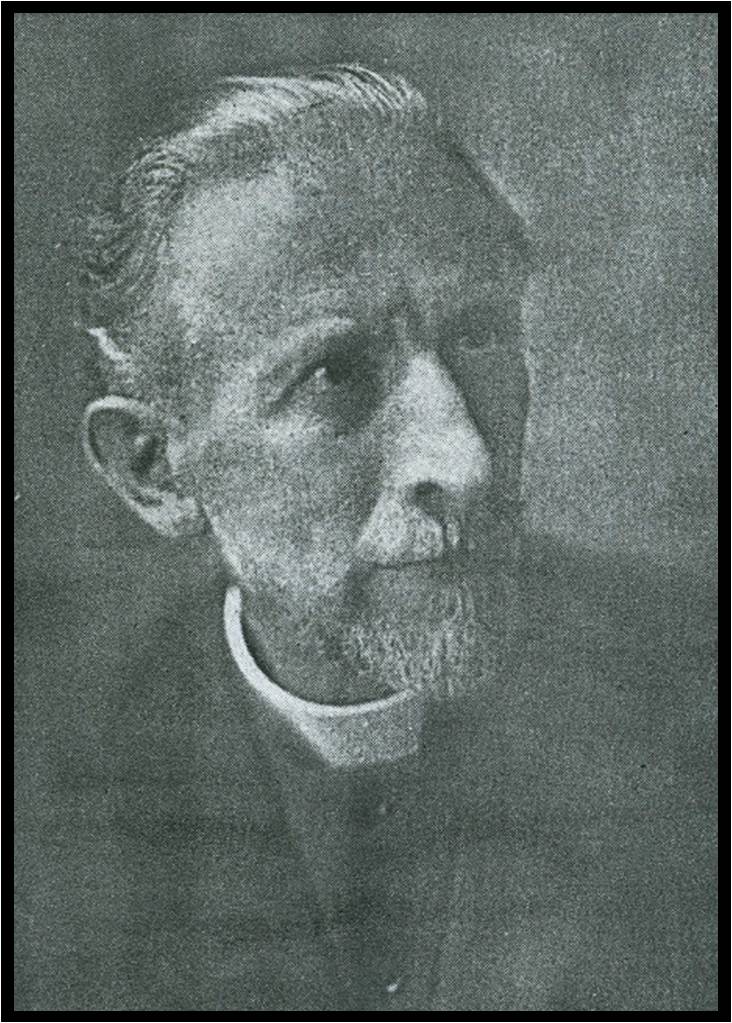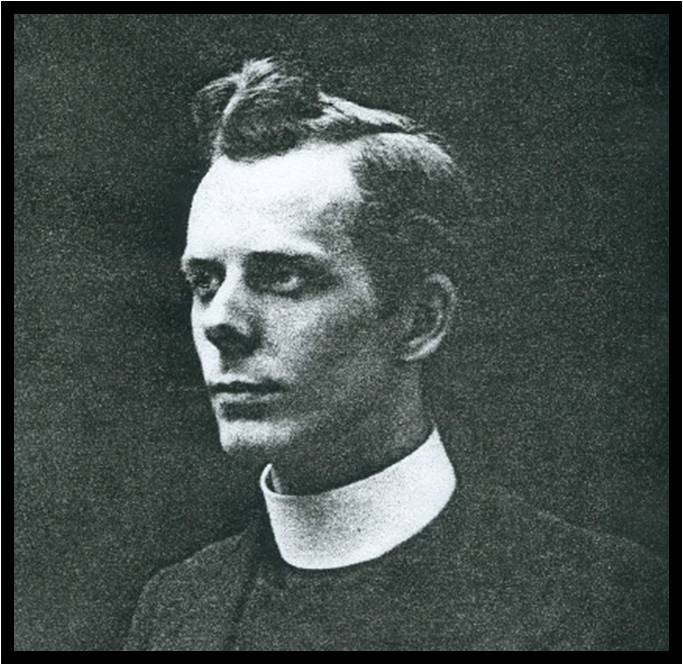"ALL OUR YESTERDAYS"
The story of a family.
------------------------
CHAPTER THREE
About my grandfather WILLIAM ALFRED PRESLAND his wife and their four sons, and a
look at the family links around them both.... PULSFORDS, JOHNSONS etc.
-----------
BY C. H. PRESLAND.

William Alfred Presland's signature
On 26th of October, I turned my attention to this chapter, and hope to have it
ready for Judith's birthday on 28th November. Like the other two chapters, it
will be knocked off at some speed.
My brothers and sisters can probably add a lot to what I now write.
The next and final chapter will he ready, with an index to all 4 chapters I
hope, for my dear wife's birthday in April 1985, and will carry what she and I
know about her side.
Grandad was the much respected Minister of the Camden Road Church for very many years - his grandchildren were brought up there, aware of that respect, and a wee bit surprised that so many in the congregation there called him "Uncle" or some such family name. I will try to weave them all in - if I can! - and get our Presland links in the New Church tied up right. I expect to get lost myself - if I do, I will do some research and put a supplement in chapter four!
"READY RECKONER" of relationship to my grandfather ("WAP" for convenience) and his brother, Rev John Presland. Tenuous or close.
| PAGE | |||
| AYRES | Sydney | Nephew | 71 |
| (links with A. T. Chadwick, Via Highams, to Brian Kingslake) | |||
| Roger CROMPTON of Kearsley | Uncle and Aunt | 29 | |
| GRAHAM | Sister/brother in law | 85 | |
| HOWE | Dr. E . Graham | Nephew | 60B |
| (Rev E C Howe not related, different family) | |||
| HUMPHREYS | James & Sophia | Sister/brother in law | 61 |
| Foster James | Nephew | 61 | |
| JOHNSON | Jane | Mother | 32 |
| Philip Henry | Great nephew | 59 | |
| Pat and Ian Johnson | Great-great-nephews | 59 | |
| Sir William MATHER, PC., M. P. | Cousin by marriage | 61 | |
| POTTS | Rev, J. F. | Cousin by marriage | 61 |
| (Producer of the Swedenborg concordance) | |||
| PRESLAND | John Rous | Son | 63 |
| Claud William | Son | ||
| Frederick Richard | Son | ||
| Herbert | Son | ||
| PULSFORD | Mrs. E. Miall | Sister | 44a |
| Mrs. John Presland | Sister in law | 59 et seq | |
| Rev. E. J. | Nephew | opp. 63 etc | |
| Mr. L. H. | Nephew | ||
| R G (our "Ray”) | Great-nephew | ||
| PURCELL | Unity | Wife | 54 55 |
| and her sisters | |||
| ROUS | John | Wife's grandfather | 55 et seq |
| ROYCE | ? ROLLS ROYCE ? | Sister-in-law | 55 |
| TROBRIDGE | George | No relation | |
| (Author of classic life of Swedenborg) | |||
| his son and daughter = | |||
| Ernest = Mrs. Ernest | Niece | 62 | |
| Dorothy | Daughter-in-law | 62 | |
| WATSON | Several members | Cousin by marriage | 61 |
From The Daily Telegraph, Tuesday, September 30, 1975:
I WROTE TOO LATE - NEVER ANSWERED
Written on 24. 9. 75:
I have for a long time desired, and am now bold enough, to write to you about the entry under JOHN PRESLAND in "Who's Who" concerning you and your many activities.
The name of John Presland is well known within my family and the New Church organization. Many years ago my late grandfather wrote an article about his grandfather, who was a John Presland, a copy of which I enclose. Since then, the name has come into every generation of my family, and is now carried by my own son, who is a Bank of England official.
I hope one day, perhaps when and if I retire, to put together the considerable mass of information I hold, at present in very scrappy form, about the Presland family as I know it, mostly within the orbit of the New Church and the Swedenborg Society. I wondered if your use of the name "John Presland" means that, on your mother's side, you trace back to the same ancestry. There are several of our surname in the London phone directory, a few of them my close relatives, but most of them not known to me.
Yours faithfully,
Mrs. Bendit,
4 Marlborough Court,
Hamilton Terrace, N.W.8.
Gladys Bendit, the author and poet, who wrote under the pseudonym of John Presland, left £48,284 net (£48,995 gross) in her will published yesterday. Mrs Bendit, who lived at St. John’s Wood, died last September, aged 86.
A postscript before I go further about the PRESLAND/PULSFORD links.
Yesterday I came across a touching little note in I. R. i. e. Intellectual
Repository (the Church paper of those days) concerning the death of little
Leonard Presland, 1874:- "At 4 Squires Mount Cottages, Hampstead, whither he had
been taken for the sake of his health, Leonard Theodore, the only child of the
Rev. and Mrs. John Presland, was removed at the age of six months to his
heavenly home... his parents, who have twice before experienced a similar
bereavement, trust that this third treasure laid up for them in heaven will fix
their hearts there more and more, and help every day to lead their footsteps
thither.. "
The parents therefore are my great-uncle John, whose wife Martha Jane was sister
to the Rev. Edward Miall Pulsford and therefore great-aunt to Ray Pulsford, and
his older brother Garth, and his sister Beryl (married to Ron Lewin of Bristol,
and linking up to the Lewin family.) I do not know if the John Preslands had any
more children but I do know that they adopted a child Ethel. (See page 50).
I know no more after Ethel married.
* * * *
There is another link to mention here. Above we have a male Presland marrying a female Pulsford. We have also, in the same generation, a female Presland marrying a male Pulsford. Ruth - what a charming little picture of her! - sister of the Rev. John Presland as above, marries the Rev. E. M. Pulsford, brother of the Rev. John Presland as above. (E. M. Pulsford's parents had embraced New Church teaching about the time of his birth - I forget, I think he lived about 55 years. It can be checked in I. R. 1880). The Rev. E. M. Pulsford was a quiet, somewhat reticent, very courteous gentleman and acknowledged to be a very good pastor because he knew how to look after his people. He had as a lay man been active in Argyle Square Church (how many good people came from that vigorous Church). As a Minister, he served Leicester 1870 to 1873, Jersey from 1873 to 1880, and Alloa (near Stirling) 1880 to his death in 1899. He developed some "pressure on the brain" - a tumour, I suppose? It was beyond the scope of medicine or surgery of those days, and he died within 6 months of his illness starting.
Ruth Presland therefore is grandmother of Ray Pulsford and his generation, and E. M. Pulsford is (by marriage) my great-uncle! More about their children shortly in this chapter.
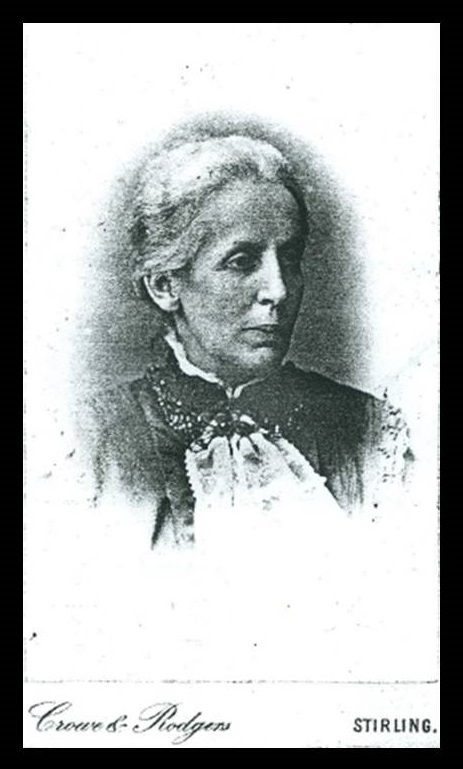
Ruth Pulsford, grandmother of Ray Pulsford
and his generation, nee Ruth Presland,
sister of my grandfather Rev. W. A. Presland.
As I have indicated, Rev and Mrs. John Presland are the same relationship to Ray Pulsford and his family as to me and mine. Ray of course married Mary Nicholls - and at this point I gladly say how grateful I am to Ray and Mary - and to the Nicholls and other families with which Mary links us - for such kindness during the now 3 years in which we have been in London. This, I would hope, goes without saying: but it should be said.
HOW IT WAS IN THE DAYS BEFORE THE NATIONAL HEALTH SERVICE - and John Presland was not poorly paid!
New-Church Services and Progress.
LONDON: ARGYLE SQUARE. - The Good Friday meeting of this society was one of special interest, as the twenty-fifth anniversary of the Rev. John Presland’s ministry. His continued serious illness, the variations of hope and fear caused by his condition, together with the inclement weather, no doubt deterred many from attending. Suffering and exhausted as he was on that day, it was still well known that his affection and thoughts were with those, few or many, assembled in "dear old Argyle Square", as he loves to call it; nor was there wanting an outward sign of either. A simple letter, written in pencil by his devoted wife, conveyed both to their sorrowing and anxious friends, and reminded them of that resignation to the Divine Will which has so steadfastly been manifested throughout this long and heavy trial. The society has subscribed nearly £200 for their beloved pastor, which amount has materially assisted him in his pressing needs. The following address, drawn up in its behalf by Colonel J. B. Keene, was submitted to the meeting and unanimously accepted. A written copy was sent on Easter Day to convey at once this expression of affection, gratitude and sympathy to the afflicted husband and wife. It will be engrossed on vellum for formal presentation, but its most enduring record is in the hearts and lives of the congregation. It is as follows: -
"To the Rev. John Presland, from the members and friends of the society of the New Church at Argyle Square, King's Cross, in quarterly meeting assembled on Good Friday, the 16th of April, 1897.
"Reverend and Dear Sir,
"This Society, to which you have now ministered for twenty-five years, hereby desires to render you their deep and earnest sympathy in the severe and painful affliction under which you have been suffering; which has for some months deprived them of the benefit of your ministry; and has prevented your presence among them to-night to receive in person their heartfelt congratulations on so long a term of active and useful service.
"The trial, both to your society and to yourself, has been all the more severely felt at a time when mutual rejoicings had been anticipated, instead of the present sorrow. The society is well aware that the painful ordeal has been permitted by the Lord, in His Divine Providence, for the wisest ends, and they reverently acknowledge that it cannot be otherwise. But none the less is it, to all concerned, a heavy trial, requiring a deep faith in the teachings of the Lord’s Second Advent to enable them to realize that all is for the best; and that, when it is past, it will be seen that it is so.
"For twenty-five years you have now ministered in their church, beloved of all. Their relations with yourself have grown uninterruptedly more intimate and pleasant; and it can be truly said that, in all these years, nothing has disturbed the peace and harmony existing between minister and congregation.
"It was the intention of the society to have taken the present opportunity to present you with a testimonial of their love and esteem, which should be a permanent record with you of so many pleasant years of loving service on your part, and of their reciprocal affection for yourself. The present unexpectedly heavy trial has led them, instead, to devote the proceeds of the subscriptions made for this purpose to the more immediately useful service of providing for the expenses of your illness; in the hope, which they believe has been effected, of relieving your mind from the responsibilities of this heavy pecuniary pressure.
"This has reduced the material form their love would otherwise have provided, to this simple expression of their affectionate regard, in the certainty that it will be equally appreciated by yourself and give you equal pleasure.
"In conclusion, they earnestly pray that the Lord, in His Divine mercy, may be pleased to restore you.
John P. died May 1st that year.
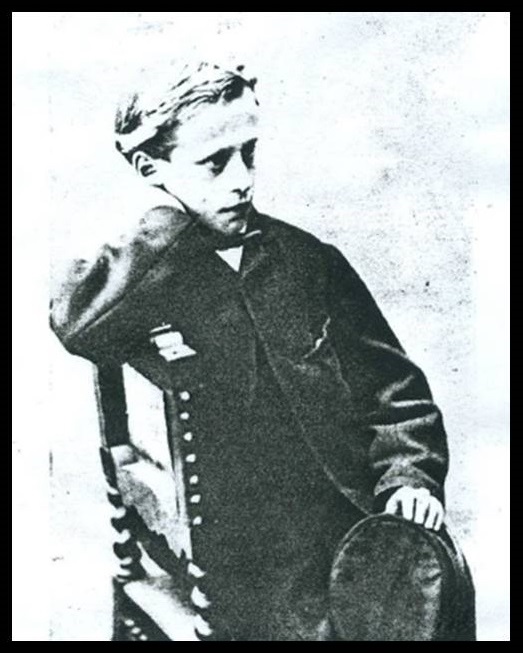
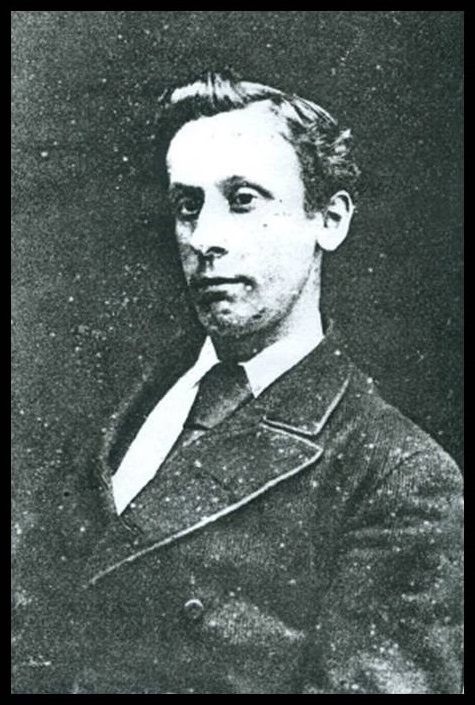
Two pictures of Grandad
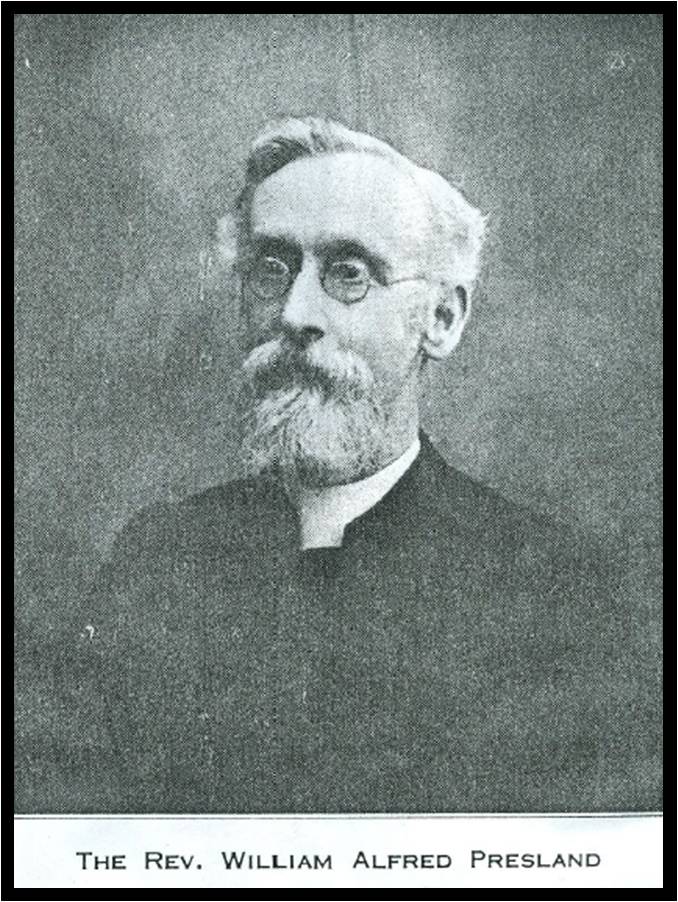
NEW-CHURCH WORTHIES
THE REV. WILLIAM ALFRED PRESLAND
ON the night of Sunday, April 25, 1937, at his home in north London, William Alfred Presland passed from the sight of men.
Through the whole span of his eighty-one years he had lived in close contact with the New Church, had become its senior Minister in Great Britain, and one of its best known men.
He was born of a New-Church family. His great grandfather, John Presland, heard Robert Hindmarsh preach at Great Eastcheap chapel in 1790. Returning to his home in Epping he related with such enthusiasm what he had heard that his son, also John, coming to London, went to the New Church and associated himself with it. This John was born on December 15, 1772, in the same year in which Swedenborg had died. He remained loyal to the Church, was a representative for the York Street Society to Conferences held in 1813 and 1814, and was a foundation member of the Swedenborg Society in 1810. For a year (1815) he was Secretary of that Society. He was abundantly blessed in his marriage; his grandson, the subject of this essay, has placed it on record that one of his earliest recollections was of "sitting in the lap of the sweet little octogenarian grandmother picking out in the big Bible the round O’s and the crooked Q's". Not only on the paternal side was he thus of New-Church parentage, but his mother also, nee Jane Johnson, was of New Church family. She died at 8 Lady Margaret Road, Camden Town on February 16. 1876. When her son William was nearing his majority, for he had been born at Lime Grove, Dalston, on August 12, 1855.
His father, Thomas Presland, held a post in the well-known printing firm of Eyre
and Spottiswoode. He and his wife had a family of eight. Of these John, born
November 18, 1839, was the eldest and William the youngest. Both became
distinguished in the New-Church ministry.
There were over fifteen years between the births of the two brothers, and William looked up with a sort of hero worship to that grown-up brother of his; always looked up to him.
The first great sorrow in William’s experience was the death of a sister, Emily, his playmate in tender years. The little girl had been the darling of the household, and he was woefully sad. John, himself deeply moved, tried to comfort him; clearly with some success, for many years later his brother wrote “Till then heaven had only been a word to me; he was trying to make it a reality and to assuage my altogether natural grief with something of the faith that comforted him.” One by one William was to see them all pass into the beyond, and the early faith grew as the years went on. So much was this so that, though the voice would break a little now and then, he would take the funeral service when one of these dearly beloved ones went into the world of eternal realities.
He was educated at the little market town of Belper, in Derbyshire. In those days a Mr. Applebee had a boys’ school there. He was a New-Churchman and the school was largely supported by New-Church people. Mr. T. C. Lowe, later of Birmingham, was one of the masters, and was succeeded by John Presland, who had also been educated at Belper from twelve years of age.
In those days only one train a day need be run to any station, at 1d. a mile, and such a train was known as “The Parliamentary” because it filled this legal requirement. It was not comfortable; for third-class folk there were carriages with hard wooden seats. If there was any heating it was by means of a steel cylinder filled with hot water and pushed into the compartment when the train started; somewhere down the line it might, when cold, be replaced by another, perhaps not. On one occasion Thomas and his son William arrived late at the London terminus and missed the Parliamentary. A higher fare had to be paid and the boy travelled in comparative comfort. It was in the depth of winter. Who knows what might have happened to the little traveller if his father and he had not been late and the colder journey had been undertaken!
School days were happily spent and the boy acquired a profound respect for Mr. Applebee and his staff. Friendships were formed, among them with David Royce. This friendship continued and was rendered the more intimate because the two, in manhood, married sisters, first William marrying Unity Josephine Purcell and later David marrying Beatrice, whom he met at his friend’s house in Accrington. The sisters were of New-Church family; their grandfather, John Rous, was among the writers of pamphlets in support of New-Church doctrine.
The Presland family was much attached to Brightlingsea as a place of holiday resort. In the early days of their association with it the nearest railway station was at Wyvenhoe, six miles away. But its quiet was one of its attractions, and another was the fact that it had a New-Church Society. At Brightlingsea the river clone comes into the sea and there is an inlet of the sea known as St. Osyth Creek. These waters were a constant source of delight, and Mr. Presland’s love of the sea doubtless had its beginnings on the yachts and the rowing boats of Brightlingsea. One year sorrow came, for Thomas Presland, a brother, died here, his remains being buried in the churchyard of the fine old Parish Church, the tower of which can be seen for many miles over land and sea.
School days over the lad was apprenticed to a Mr. Thomas Ashbey to learn the art, trade, or business of a Blind Maker. This was on September 22, 1869, and the Indenture of Apprenticeship is still in existence. It may be worth quoting in part as showing the conditions usual at that time:
The said Apprentice his Master faithfully shall serve, his secrets keep, and his lawful commands obey; he shall do no damage to his Master or his Goods, nor suffer it to be done by others, but shall forthwith give notice to his said Master of the same, when necessary... the said Thomas Presland agreeing to pay unto the said Thomas Ashbey the sum of Twenty-five pounds as a premium and the said Thomas Ashbey agreeing to pay unto the said William Alfred Presland wages during the said term as follows: two shillings and sixpence per week during the first year of the said term as follows; five shillings per week for the second year; seven shillings and sixpence per week for the third year; ten shillings per week for the fourth year; twelve shillings and sixpence per week for the fifth year; fifteen shillings per week for the sixth; seventeen shillings and sixpence for the seventh and last year of the said term... the said Thomas Presland finding the Apprentice sufficient Meat, Drink, Lodging, and all other necessaries during the said term. And it is hereby agreed that the working hours of the said Apprentice during the first two years of the said term shall be eight hours per day and ten hours per day during the remainder of the said term, overtime being paid for at twopence per hour for the first year and threepence for each hour for the remainder of the term.
There was much overtime to be done and there was a long way to traverse from home to the place of business. For though at the time of the indenture the family lived in Bayswater, fairly near to Mr. Ashbey’s workshops, it moved to the Camden Town area during the seven years, probably to be nearer Argyle Square, of which Rev. John Presland became the Minister in 1872. It was an expensive matter to go and return by public conveyance and much of the way had to be traversed by foot involving an early start and a late return. The lad was often intensely weary and would drop off to sleep as he knelt at the close of day for bedside prayers.
But by now the Church was becoming a main interest in his life. Sunday was a day of delight for he could be at the Services and Sunday School as he loved to be. What did the weariness of the week matter when there was solace on the Sabbath! There was good companionship at Argyle Square - men like Fred Gardiner, and Fred Buss, and George Trobridge, and Edward Pulsford, and Hubert Huntley. There were week-night meetings and occasional excursions, and in that congenial fellowship of young men and young women of the Church there was not only discussion of serious matters, there were also fun and laughter and love-making, William knew well how to enjoy interests both grave and gay. More than once he has shown the present writer the very place in Hadley Woods where George Trobridge was introduced to Georgina Huntley, who later became his wife. It was on August 12, 1876, the day when William was twenty-one.
His mind began to consider a problem. Could he do what his brother had done? Could he become a New-Church Minister and lead a company of men and women to know Jesus Christ as the New Church knew Him and to follow Him? He thought his way through the theology; he accepted it. He felt himself drawn to this as his life’s work. Brother John thought so too; the family and friends encouraged him. He applied to the New-Church College for adoption as a student.
Then came a disappointment. Like all candidates for studentship he had to undergo medical examination. The doctor was not pleased with him, for the days of his apprenticeship had told on him and, too, one eye was almost sightless. He was sent to a specialist. The specialist sent in an adverse report; a course of study involving close reading would overstrain the impaired sight and might even result in blindness. When he heard of this he withdrew the application. He received a kind letter from the then Secretary who stated that the College authorities hoped that he would not be discouraged by the report but would renew the application in a year’s time when his general health might have improved, though the question of eye strain would still continue.
It is rather curious that both brothers suffered from defective vision, John Presland having lost the sight of an eye through injury from a tennis ball. John knew, from practical experience, that he could carry on his duties effectively despite this deprivation! Why should not his brother succeed also? He, and others, encouraged the younger brother who was still eager to enter the ministry and was not easily dissuaded from any project he had formed after careful thought.
A leader was required for the Keighley Society and Mr. Presland was invited to accept it. He did so and laboured very acceptably for over a year from 1878. Then in 1880 he went to Edinburgh, living with a Mr. and Mrs. Swan until his marriage on August 8, 1882, when he and his bride occupied a little flat on the top floor of one of the city's huge blocks of flat property. When he retired from the active ministry, fifty years later, he paid one of his many tributes of devotion to her at a farewell meeting at Camden Road: "My dear wife has kept me fit for work all these years, and has helped me in many ways you know not of. I appreciate the way in which you have expressed your affection for her also".
A few days after the wedding, on August 18th, he was ordained into the Ministry at the hands of the Rev. Richard Storry. At that time the Countess of Hopetoun took a great interest in the little Society. She contributed largely to the cost of the piano which was the Society's gift to its Minister and his bride, and she sent the flowers which were used for decorating the Church on the occasion of the Ordination Service.
From Edinburgh, a happy, thriving, but small Society, Mr. Presland was called to the largest Society in the Church. In 1883 he went to Accrington with a membership nearing 500 and a Sunday School of over 700 scholars. Here three of his family of four sons were born, and lifelong friendships were formed, among them that of Mr. R. W. Kenyon. But the work was necessarily hard and it became obvious after a few years that a less strenuous pastorate must be sought.
In 1889 Mr. Presland removed to Glasgow to become the first Minister of the Queen's Drive Church in the south of the city. There he spent two years acceptably, save that they were marred by ill health. His congregation treated him with every consideration and one, Mr. Henry Carlyle Fairlie, gave him many happy and health-restoring times on board his yachts, either sailing in the Clyde waters or cruising among the islands to the west of Scotland. He took him away on a voyage to the blue Mediterranean, where he saw Portugal and Italy and other countries of southern Europe.
But a longer rest from duties was imperative and the Glasgow pastorate terminated in order that treatment might be obtained at the Hydropathic Hotel in Forres, in North-East Scotland, and elsewhere.
After a year, his health considerably improved, Mr. Presland was invited to accept a temporary engagement with the Camberwell Society with a view to a definite engagement if his health permitted. This he accepted, his wife and family meanwhile staying in Alloa where the Rev. Edward Pulsford, a brother- in-law, was the Minister. The Rev. and Mrs. E. Pulsford were the parents of the Rev. E. J. Pulsford, who about that time went to London to start work in an architect’s office. In a letter dated October 21, 1892, Mr. Presland wrote to his son John,
Eddie and I came to London in a very nice carriage. There was a little passage down the side of it, into which all the compartments opened, ... and we could walk about in the passage when tired of sitting.... Good-bye, Laddie - that means God be with you, and I hope God always will be with you, and He certainly will if you look to and pray to Him and do what is right.
London conditions contributed further to Mr. Presland's returning health and he was asked to continue at Camberwell. At the end of six months the family was united in an unpretentious little home at Crofton Road. Here three years were spent, and the youngest son was born. There followed an engagement with the South Manchester Society from 1895 to 1897. To these years he always looked back with a deep sense of gratitude for the kindness and love shown to him by officers and members. Here, with his friend Mr. R. W. Ellam, he spent many days tramping over the moors of Derbyshire rejoicing, as he always did, in congenial companionship and the beauty of the country scenes.
In 1897 began the thirty-six years' ministry at Camden Road, London. Friends of his youth were earnest members of the Society. London itself had a great attraction for him, and he looked forward to close and frequent contact with his brother John, who continued to minister to the Argyle Square Society. But that contact was to be denied the brothers, for on May 1, 1897, John Presland was called to higher service in the Kingdom itself.
Throughout the Camden Road ministry a far reaching influence for good was exerted. The Services of the Church were conducted with deep reverence and the utmost care taken that the sermons preached should be well prepared, doctrinally correct and of practical import. The whole appearance and sphere of the man, slight in build but dignified in bearing, was that of one “who had been with Jesus.” His people knew that they could come to him in their deepest troubles, even those hardest of all troubles when sin had to be confessed and the way of forgiveness sought. Yet there was nothing spectacular in the results; it was rather by a widening influence than a well-filled church that he made Camden Road a centre of spiritual life. The Great War came and the serious difficulties in Church work which succeeded it. Since 1914 the membership of the Societies connected with the General Conference has declined by nearly a thousand leaving, in 1936, a total membership of 5,792, while attendances at Sunday worship have diminished by over 3,500 a Sunday. Even experienced Ministers were unable to stay the tide, and Camden Road suffered with the rest.
Not only did the charge of Camden Road rest upon Mr. Presland but, in 1907, he was appointed as the Principal of the New-Church College, first at Islington and later in the new premises at Woodford, Essex. This position he retained until 1931 when he found the long journey from his house in East Finchley and the College, two or three times a week, too prodigal of time and strength. Thus for nearly a quarter of a century he exercised a profound influence on the thought of the men training for the ministry. An appreciation by one of them follows this article; it may be taken as representative of the regard his students had for him. They were his "dear boys" and he followed their careers with the interest of a spiritual father.
He was a member of the Swedenborg Society's Council, Secretary of its Advisory and Revision Board, and often at work as a consultant for some revision or new edition of the Writings. He was a President of the Society, and from 1925 its Honorary Chaplain. He found time to attend meetings of the Missionary and Tract Society and other calls made by central bodies operating in London and individual churches there. On three occasions he was President of the General Conference and was appointed an Ordaining Minister in 1922. He was looked up to in Conference as an expert in procedure and for many years was the Secretary of the Sessional Committee on Rules. There are few Presidents who, at difficult occasions of debate, have not been helped when he intervened, usually with the formula — "Mr. President, on a point of order... ".
He was a respected member of the West Holloway Council of Ministers, of which he was the senior member in years of service in the district, a worker on the Holloway Branch of the League of Nations Union, and a staunch Liberal in politics.
As a student of New-Church theology he held an honoured place. The books and pamphlets he wrote in defence and elaboration of that theology were widely read. He devoted much time to the study of Swedenborg’s Latin. He found Pitman’s short-hand of great use and would often correspond through that medium with Mr. Gardiner, the Revs. W. H. and J. Buss, the Rev. W. H. Claxton, and others. The writer treasures an excellent specimen of his penmanship. He remembers with delight an occasion when a card came from Mr. Claxton to Mr. Presland. "Claxton is a very good fellow", said the latter, "but I wish he would not write to me in this microscopic shorthand of his". A few days later the writer was a guest at Mr. Claxton's house when a letter came from Mr. Presland. "I've a great respect for W. A. P." said Mr. Claxton, "but he writes abominable shorthand". It was perhaps variation in outlines that brought to an end the Shorthand "Evercirculator", a manuscript production of articles and comments which flourished for a time among a circle of New-Church Shorthand enthusiasts, the above-mentioned men among them!
His recreations were chiefly cycling and walking. He loved the open air, the country, and the sea. Monday he tried to keep free from engagements and, securing the companionship of a son or friend, would cycle or tramp for the best part of the day. For some years he delighted in a camping holiday. A few days under canvas after Easter would refresh him amazingly when jaded with a winter’s hard work, and he knew how to dish up an appetizing three-course meal with only a small Primus stove on which to cook it. If there were water near by for a swim he would be in it, and he had the satisfaction of knowing that his insistence that all his boys should learn to swim saved the life of one of them. Whether camping, cycling, or walking he was a dear companion and oft-times on seeing a galaxy of stars, or the expanse of land or sea, his rich baritone voice would be heard in a verse of praise to the Almighty Creator of the world. Ships and the sea had an almost irresistible appeal for him, perhaps because on several occasions when he had been overworked, and generous friends like Mr. David Wynter had made a sea trip possible, he came back with a new zeal and energy - his own man again.
In 1933, though with difficulty, he was brought to realize that he was no longer able to bear the full burden of a minister’s life, and he resigned from Camden Road. He was, however, able until the end of 1935 to preach in London churches and he undertook the Honorary Pastorate of the Willesden Society. This was ultimately relinquished, and to one after another of the interests he had served he intimated that he was no longer able to take a share in their work.
In the early part of 1936 he was gravely ill at "Homeleigh", Snodland, the manse of the Snodland Society of which his eldest son is the Minister. In those weeks he thought little of himself; often he would say "I am so sorry to give all this trouble"; instead of dwelling on his woes he would engage in prayer or recite from psalm, prophecy, or gospel; doctors and nurses marvelled at his patience in suffering. It seemed as though he would succumb to the weakness that overtook him. But he rallied and returned in the summer to his own home in East Finchley where he quietly passed the days, surrounded by loving care and in comparative physical comfort. One sorrow came in the death of the youngest son, Herbert, but to mitigate that sorrow was the loved companionship of his wife and the frequent visits of relatives and friends.
Mercifully, when the end came for him, it did not again involve months of suffering but an early passing into unconsciousness and an escape from the limitations of a worn-out frame into the liberty of the spiritual world. Almost a year before when settled for sleep he had said "A kind good-night to all". Had he known of the call awaiting him some such kindly message would have shown, as he had shown all through his life, consideration for others rather than concern for himself.
AN APPRECIATION
BY A FORMER STUDENT OF THE COLLEGE
MR. PRESLAND came regularly to the old College in Devonshire Street, Islington, on Wednesdays and Fridays. I cannot remember that he was ever late. We met in the schoolroom in the afternoon. In winter-time a huge fire filled the old-fashioned grate, and we sat in a semi-circle round it, with Mr. Presland at one corner. No amount of manoeuvring, however, could eliminate the draught which came from all quarters, finding weak spots in our necks or backs (even through overcoats) before finally roaring up the chimney.
We studied theology with him and a whole succession of students owe to him their initiation to a sound and affirmative approach to the Writings. Generally there were two books to be studied each year. We read one on Wednesdays and the other on Fridays. We read round in turn, a method which, though somewhat monotonous, at least ensured that we missed nothing. From time to time Mr. Presland, or "WAP" as we affectionately called him among ourselves, would interject a few words of explanation; and frequently he would refer to and read from other passages in the Heavenly Doctrines, or to other theological textbooks, and occasionally even to quite secular publications, which invariably helped our understanding of the work in hand.
These cross-references, the result of many years of study and teaching-experience, revealed our Principal as a theologian of no mean order. On occasion he would explain modestly that he had never desired the principalship of the College, considering himself to be less well equipped for it than others; but the more intimately we knew him and profited by his instruction and example, the more we appreciated the wisdom of those who had persuaded him in days past to undertake the work.
There could never be the least doubt of his supreme love for the Church and the uses of the Ministry. Though he appreciated and encouraged scholarship, and never tired of recounting the prowess and accomplishments of former students, his aim appeared to be not so much to make us brilliant students, as to make us wise and sincere pastors. To this end he frequently illustrated doctrinal teaching with anecdotes from his own rich experience, and his occasional pastoral talks (appreciated too little at the time by at least one student!) were such as only a faithful and well-tried servant of his Lord could give.
Mr. Presland delighted to tell us of the New-Church stalwarts of former days, of the giants whose successes we might emulate, and by whose failures we might be warned. He would speak of the saintly Clowes and his vision of the words "Divinum Humanum"; of Samuel Noble whose handwriting grew larger and larger as his sight failed; of J. F. Potts and his amazing labours at the Concordance, which he knew was needed and therefore compiled with no monetary encouragement, no knowledge of whether he would get it published, and at which he worked in odd moments when other men slept or idly talked; of James Hyde the Bibliographer and his early death through; overwork; of his own brother John at Argyle Square; and of his own youthful experiences.
His strong sense of humour gave vivid colouring to these anecdotes. I remember him chuckling so much sometimes at the recollection of some incident that, as he leant back in his chair, he could hardly find the words to speak for laughing. Yet he had his graver moments; and if occasion demanded he could administer a rebuke which lost nothing of its effectiveness through the realization that anything requiring the lightest reprimand was really painful to him, and that in his reference to it duty had fought with inclination and had won a hard battle.
On Wednesdays after theology we had "sermon preparation and delivery". The students took turns to prepare a sermon, which was delivered in the chapel or schoolroom in the course of a short service. Afterwards we gathered together for criticism. Each student was called on in turn, and then Mr. Presland spoke last. He was never unkind or discouraging; but though senior students could find weak points in our sermons, it was to WAP we looked for constructive criticism, and from him we gained incalculable help when he went over our MSS. point by point.
He taught us (so far as were willing and able to learn) to preach sermons and not academic theses, and to teach the truths of the Word and not our own ideas.
It was typical of him and his love for freedom that the preacher always had the right of reply to his critics. And in the theological classes he thought no less of us if we took a different view from his own on a particular point. Indeed where there were differences of opinion he usually gave us both sides of a question and left us to decide for ourselves. At the time I used to think this a pity. With youthful intolerance I wanted a definite decision, and wished, I fear, to prove others wrong. But WAP's wise influence led to a greater tolerance, and enabled us to see that truth is many sided. I have since thought that the growing spirit of charity and tolerance in our Conferences, which has been noticeable in the last few years, is due in no small measure to the influence which this venerable and gentle soul exercised over the "dear boys" whom he loved and served so well.
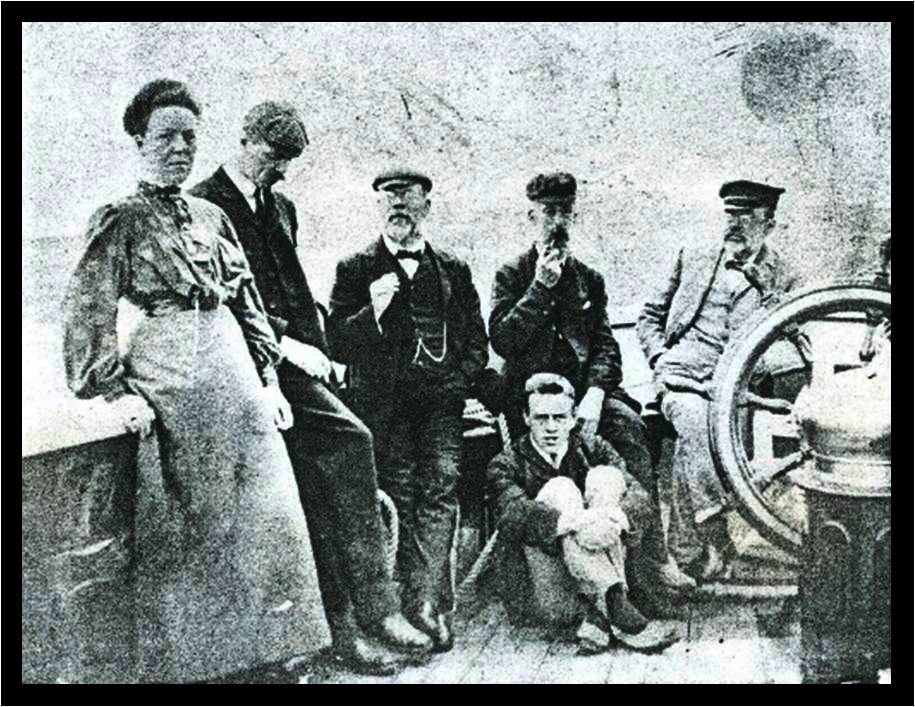
Grandad & his pipe.
They knew how to look after their Minister!
The schooner "Ayacanora".
Among the first editions of Swedenborg in my study is a 1771 Latin "Vera Christiana Religie" (True Christian Religion!) which belonged to WAP, as many of my books did. In it is a note from Colonel Bevington - first Mayor of Bermondsey and a prominent Londoner of his day, then living at Sevenoaks - "begging" WAP's acceptance and saying He bought it from Rev. John Presland's library. I find that most strange. Why did some/all of John's library go on the market? Financial reasons? I would doubt it.
A rather nice pocket sacramental set, generally in a hidden part of a drawer in my desk, came from WAP found in his desk at his death. It is French or Italian silver, apparently. None of us know anything about its origin.
The College used quietly to do a vast amount of work, which is why I use the word "prestigious". (to follow) E.g. In 1934 there were over and above 8 resident students and 48 laymen studying in 5 groups all over the country to help the ordained ministry.
A tobacco jar in our lounge, with a John Peel sort of character on it, is said to have belonged to John Presland the hatter. So, it is family tradition! But it is "Royal Doulton" – and I suspect "royal" was added to Doulton later than that.

BK's hand. A customary greeting!
The BKs and the CHPs have a very distant blood
connection but have, with the BKs largely
in S Africa and the USA, built up
a strangely charming spiritual affinity.
WAP's aim "appeared to be to make us wise and sincere pastors", so it is said in the previous APPRECIATION. There were two other ministers on the College staff in those rather prestigious days of the College at Islington, James F. Buss, a very deep theologian, and Arthur Clapham, a much younger man, a great Hebraist and a forthright doctrinaire. Brian Kingslake gave me, not for publication, a poem he wrote light-heartedly to a fellow student under that triumvirate who longed himself to be a deep doctrinaire. It goes:-
"You are old, Father William," the young man said,
"And your hair has become very white:
But I wish you would try to get into your head
That I and the Doctrines are right!
I have climbed to the top of a mountainous peak,
While you are down there in the valley:
Do you think that because your own muscles are weak,
A younger man also should dally?"
"In my youth," said the sage as he shook his grey hair,
"I scaled every mountain and rock;
But, finding the peaks were so empty and bare,
I turned and went back to my flock.
We are judged by our love, not by all that we know;
But I don't want to argue your claims.
If you're out for a fight, I would beg you to go
To your uncles Arthur and James."
As I read all about Grandad WAP, who died when I was 20 and who perhaps I never really did know as I might have done had he lived to see me in the theological school, I reckon Brian has neatly summed up the stand WAP took against meaningless hair-splitting argument in favour of a warm but very lucid and clear appreciation of the significance of heaven's truth.
(In passing, WAP's nephew Sidney Ayres, in due course married a Higham: Brian Kingslake's mother was a Higham. Brian Kingslake (BK) comes in the sphere of the wide links of the family! So much so, that BK wrote to me November 1975, "WAP's attitude was, to me, the Conference attitude at its best, and I went along with him fully, even to the extent of getting him to marry Jill and me - at Camberwell, under Arthur Clapham's nose.")
In passing, it is a strange thing that of all of us in the New Church within the family, I am the only one who has represented the British New Church in the New Church in America. Rev John Presland wouldn't go so far by boat and leave his wife behind: WAP arranged to go, somewhere about 1924, as requested by the Church here, but, as he records in a Year Book of that period, a strike delayed the boat leaving port here and, such was the slowness of travel, he would have arrived in the States when the Convention there had all met and gone home! My own literally flying visit of some 19 days is recorded in the Herald of 1956: I was sent out to try to restore warmth of feeling between the Church here and there, which seemed to have got lost, but when I got there I found out at the first breakfast there that there was no such lack of warmth and so I started on a most happy and fun-full visit! (Perhaps I may pop into this chapter a little about that visit - let us see how much space there is). You noticed in the article about New Church Worthies that WAP was said to be reluctant to become Principal of the College. I found an interesting m/s letter of his in the archives, which I shall put back there, dated 25 July 1907 which made me aware of the accuracy of the writer of that tribute to him. Here is part:-
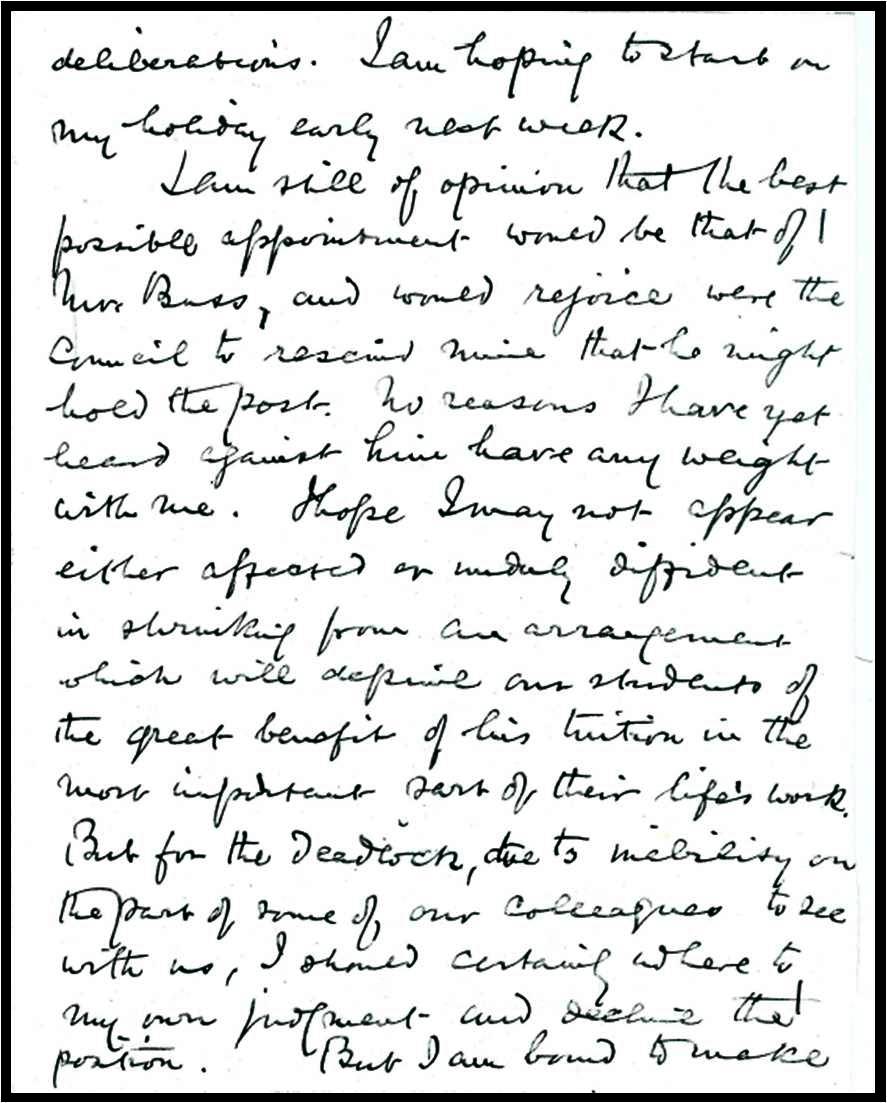
and so the letter proceeds and is signed with the to-me familiar signature of Wm. A. Presland.
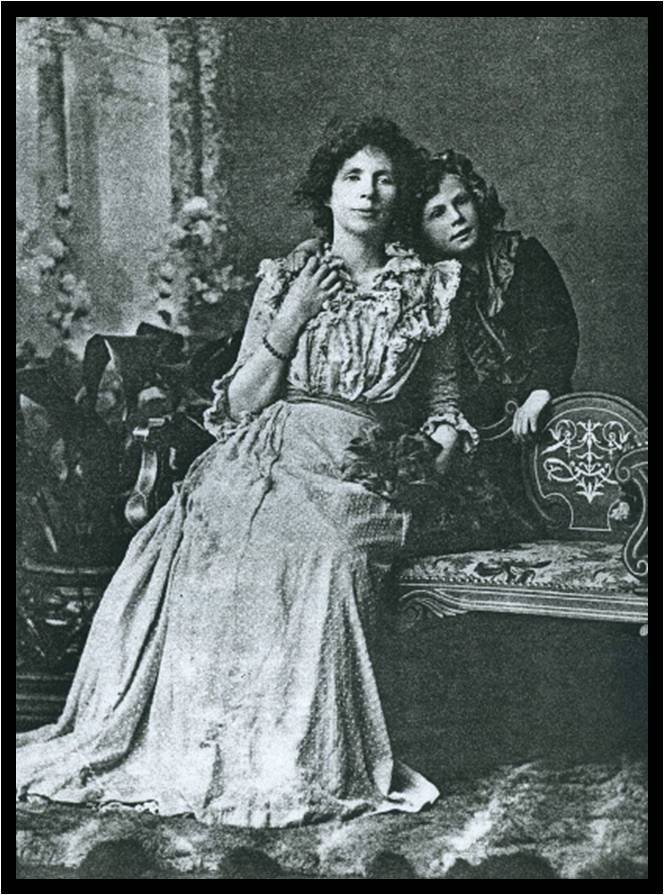
Grandma Jane Presland
and one of her sons
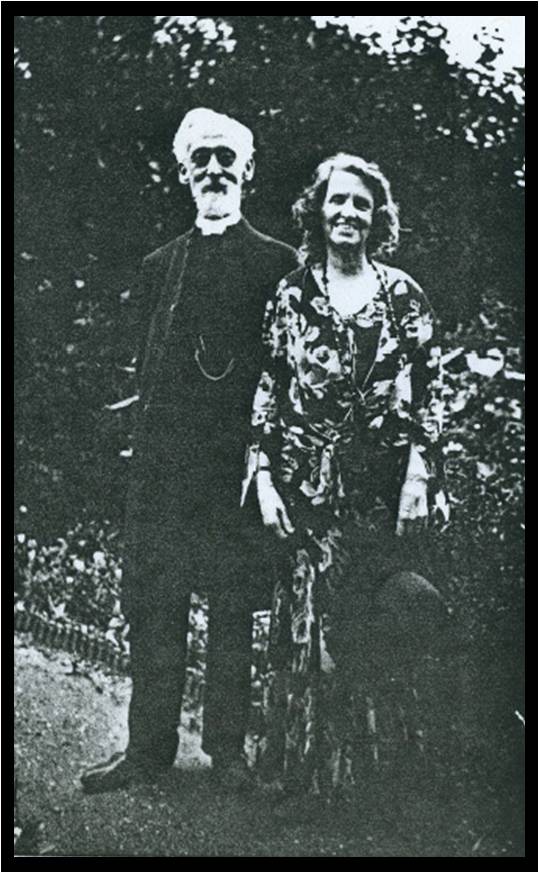
In old age in the garden at
"Homeleigh", the then manse
of the Snodland society.
He had been very ill.
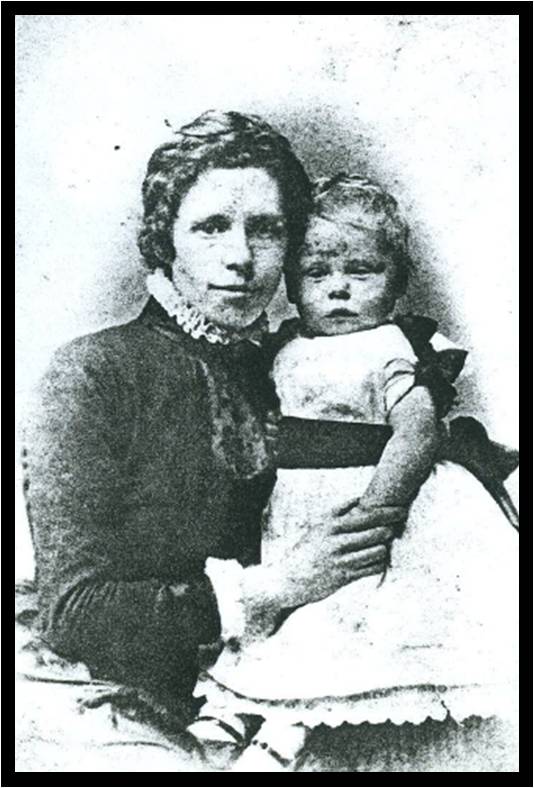
Two of the W. A. Presland boys,
I don't know which.
GRANDMA - MRS.W.A.PRESLAND - she died in the war-year, 1943.
On Friday, April 9th, Mrs. Presland quietly passed from the consciousness of natural life in this material world into the reality of the spiritual world, at the ripe age of 86 years.
Unity Josephine Purcell, one of the third generation of a New-Church family, was married to the late Rev. W. A. Presland in the year 1881 and at the time of her husband's death in 1937 had completed over fifty-six years of happy married life.
During that period Mrs. Presland passed through many vicissitudes. Her husband, never robust in health, was the object of her constant and affectionate care. No doubt it was through such care that Mr. Presland was enabled to serve the Church with outstanding ability in many capacities for a long period of years. The marriage was blessed by four sons, the eldest of whom is the Rev. J. R. Presland, now at Bath. To bring up and educate these four boys was no easy task, especially when we remember the meagre stipends paid to the ministry in those days.
A vivacious character, with abilities extending in many directions, Mrs. Presland retained her faculties right up to the last. Not so long ago, when a poem, "Daffodils", appeared in the New-Church Herald which appealed to Mrs. Presland, she quickly learned it by heart and recited it with a true and intense dramatic zeal. With a justifiable pride she would show to her friends artificial flowers, wonderful in colour and form, which she made. During the brief periods in which she was enabled to leave her bed, she loved to sit and play her piano. After the "blitz" at Bath last April, when she had to be temporarily removed to a nursing-home, owing to the damage to her house, she was perfectly resigned to the situation and full of praise for the kindness and attention she received from the nurses and attendants. These episodes sum up and typify a beautiful character. Time has worn out the body; it has told its story of weakness; eternity will tell the story of strength.
A.J.S.
PRESLAND.—On April 9th, at 8 Devonshire Villas, Bath, after much suffering borne with great courage, Unity Josephine Presland, widow of the late Rev. Wm. A. Presland. Her mortal remains were interred in the Locksbrook Cemetery, Bath, on April 14th, the Rev. A. J. Stanhope officiating.
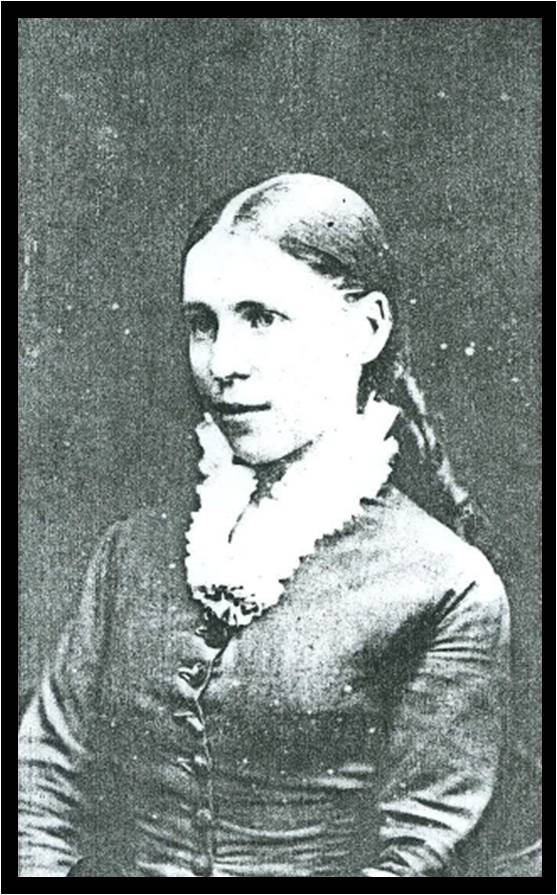
(Above. An early picture,
taken in a place in Regent Street,
of Josephine Presland.
An element of uncertainty about this identification,
but I would think it is a right one,
on the part of the donor of all these photographs.)
---------------------------
Grandma Presland was indeed vivacious, and she and WAP had a charming custom of giving evening of recitations and readings and music in many circles and especially in London New Church societies. My generation remembers her with great affection - unable to resist a fair and game for all the side-shows and the whirligigs, ready always to take us to the pictures while Grandad worked away in his study, and I vividly recall her singing on the stage at the Camden Road Church, "my old man's a dustman, what do you think of that? He wears a dustman's handkerchief, he wears a dustman's hat.." while he stood by and laughed happily at it all. A great gardener, a lover of poetry, a musician. Not at all the minister's wife of Barchester Towers, I do assure you, but all the better for that!
A Purcell by her maiden name, and I have always understood that she did indeed descend from the musician, and one of quite a large family. My sister Maureen sat with me in September and we tried to work out all the great-aunts, her sisters, and we thought she had just one brother, Percy.
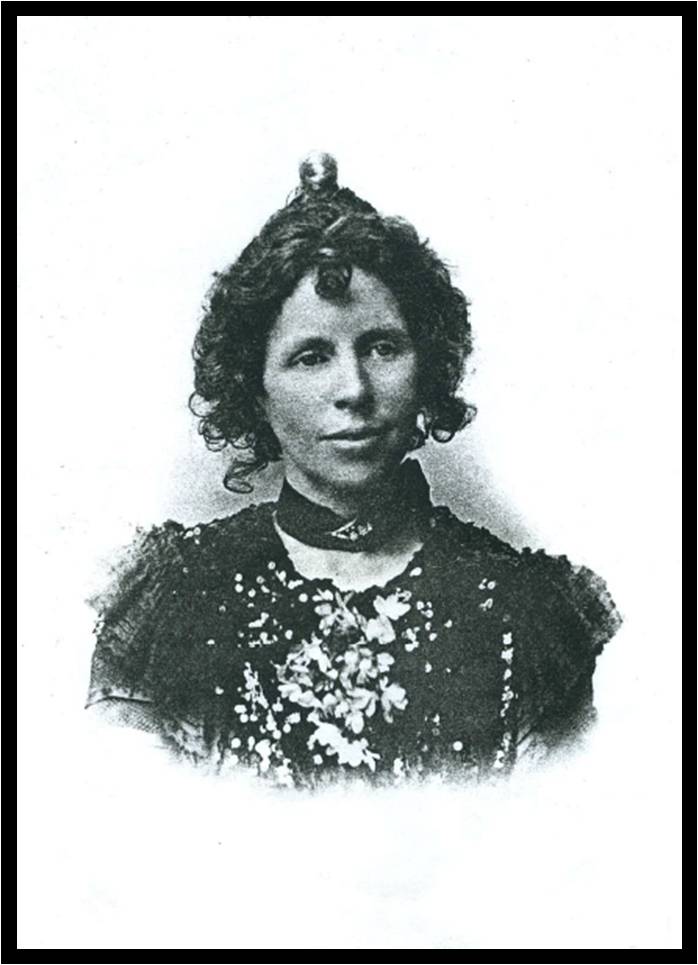
A rather nice picture of GRANDMA, fairly young.
There was Aunt Emma who had nursing experience and may have been a qualified nurse: there was Aunt Beatrice, who became Mrs Royce (and I am told her husband was the Royce of Rolls-Royce) with a son Clive and a daughter Erica of whom now I know nothing: there was Aunt May and Aunt Heppie. And there was Aunt Ada.
Aunt Ada's first husband was a Mr. Ayres (page with you are old Father William on it) - she was left a widow, with a young son, Sydney. So it fell to "Uncle Willie and Auntie Jose" to help bring him up, and he formed a fifth as it were to the 4 sons of Rev. and Mrs. WAP. He used to tell me, with a chuckle, of the awe when he "lined up with the 4 boys, outside Uncle Will's study, to explain his school report!" Sydney, whose wife is still living in Finchley as I write this, had two daughters and a son. Arnold Chadwick married one of the daughters, Elaine, and we were sad when Elaine died of cancer some many years ago.
Grandma and her sisters and brother were the children of a marriage recorded in I.R:
"on 25th December 1849, at the New Jerusalem Church, Cross Street, London, by Rev. J. Cull, Mr. Joseph Henry Purcell of Fish Street Hill, London, to Miss Susannah Mary Rous, of the same place." (Christmas Day! I do not know how in those distant days, bride and bridegroom lived in the same place.) Grandma's grandfather was the interesting fisherman, John Rous, "a typical Norseman - ruddy complexion, deep blue eyes, over middle height" as described by one who knew him, Rev. Wm. O'Mant. A fisherman in Great Yarmouth, where in those days we had a Church, with another address at 3 Billingsgate, London, and I gather he was one of the first to send, in ice, fresh fish by train to London. Grandma was born in Fish Street Hill, my notes say. (I find a suggestion that he was descended from the Earl of Stradbroke - means nothing to mel) John Rous wrote two pamphlets, both on file in the Swedenborg Society library, in defence of New Church teaching. What intrigues me is his "Fisherman's Appeal" (the original went to my cousin Graham and I only got a poor photocopy): date this about say 1867. Slavery was abolished in the USA in 1865 - and Rous, while agreeing with abolition of slavery, was horrified that the slaves were just thrown out by angry slaveholders and left to find a new life without any proper help. In effect, they became homeless - Rous tried to help. He writes a m/s note on the back of Graham's copy, "I called, I worked, I strove but could get little or no response. Not above £3.10.0 besides what I did myself and I could not well spare more. I gave £10."
(the note is a bit obscure. )
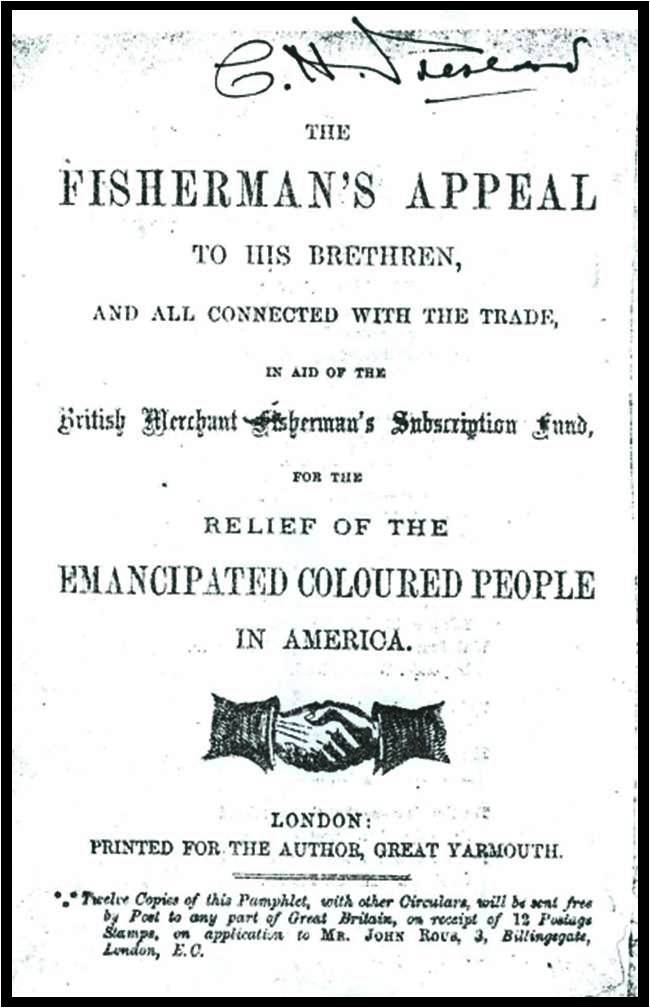
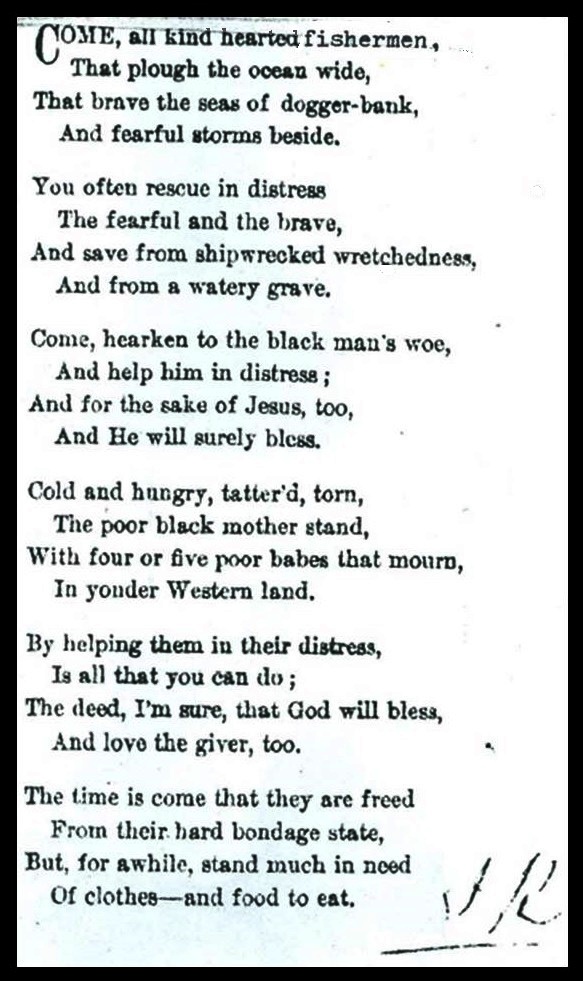
John Rous was not a great scholar or poet but his sound New Churchmanship is beyond question in this practical approach.
Part of the Fisherman's appeal page 6
God, some, if not all, of us can say:— "Yea, Lord, Thou knowest that I love
Thee". The same command, precisely, follows, and no mistake about that - which
is, to feed His sheep, and to feed His lambs. And before us, or to our notice,
is now brought an immense flock of His poor black sheep, and of wee black lambs,
about two millions of them, more or less, in a destitute state, in a country of
civil war and perils beyond measure. I am sure if the summons come to you as it
has to me, you will most heartily and gladly respond to the call.
The feeding above referred to is not mere cold, doctrinal, argumentative,
preaching. Oh no! - that’s the wrong side of the ship, by which we so often fish
and take nothing: but in this good work there is something to do at which our
charity can get warm, and which will cause the widow’s heart to sing for joy.
Allow me now to stir up your minds by way of remembrance of the words of Him
"who spake as never man spake:" who said, "A new commandment give I unto you,
that ye love one another". And then by the divine parable of the foolish and
the wise, and what distinguished them. The wise was he who built his house upon
the rock - who heard the Lord's sayings, and did them, in practical life. And by
his declarations concerning the final judgment, in which the Lord will say to
all who have proved themselves wise, in the sense of the parable: - "I was
naked, and ye clothed me; sick and in prison, and ye came unto me; hungry, and
ye gave me meat; a stranger, and ye took me in. For, inasmuch as ye have done it
to the least of these my brethren, ye have done it unto me". And also by the
parable of the men with the two and five talents - how successfully they traded.
Like them let us do: but let us ever shun the conduct of the selfish man, with
the one talent, who, perhaps foolishly and ignorantly, thought that all was
done, in some other person, for him. Cold faith alone will do us very little
good. Our heavenly Father is to be glorified by our bearing much fruit. Men do
not gather grapes of thorns, or figs of thistles; but how often do we see the
rough coated vine laden with precious fruit. Let us remember the old proverbs
"He that giveth to the poor, lendeth to the Lord." And "Blessed is he that
condsidereth the poor." - 41st Psalm. 1st verse. And John says -
"Love not in word only, but in deed and in truth: and he that dwelleth in love
dwelleth in God, and God dwelleth in him." And James says -
"If ye give not those things your brother need, how dwelleth the love of God in
you." The Lord says -
"Behold, I come quickly: and my reward is with me to give every man according as
his work shall be."
The destruction of wicked tyranny, and overthrow of other abominations, the removal of old things and placing better in their stead, with this final overthrow of Slavery, are all demonstrations of the Second Advent, when "He shall come the second time, without sin unto salvation:" and that time is fast hastening when there shall be, one fold and one Shepherd, and the Lord one and His name one. The old mists of fogs, and the bogs of men's traditions, are fast passing away, and the day is dawning when we shall see clearly, and shall have plain sailing, which suits the simple-hearted fishermen best. And though they be ignorant and unlearned men, they will have the boldness of Peter and John, and will testify by their knowledge that they have been with Jesus - to whom, and of whom, they sing the following verses:-
O LORD, OUR LORD, how wondrous great
is Thine eternal name!
The glories of thy heavenly state
Let poor black men proclaim.
Thou hast redeemed them by thy hand:
Hast set the prisoners free.
In that vast, goodly, fruitful land,
Across the Atlantic sea.
Now give them hearts of gratitude
To praise Thy glorious name.
With health, and strength, and fortitude,
While we will do the same.
I think my brothers and sisters can tell you as much as I can about Grandma. I want now to move back to the list of Grandad's brothers and sisters and talk of those who called the WAPs "Uncle and Aunt".
There were few children on Grandma's side. But first a word about the Johnson link.
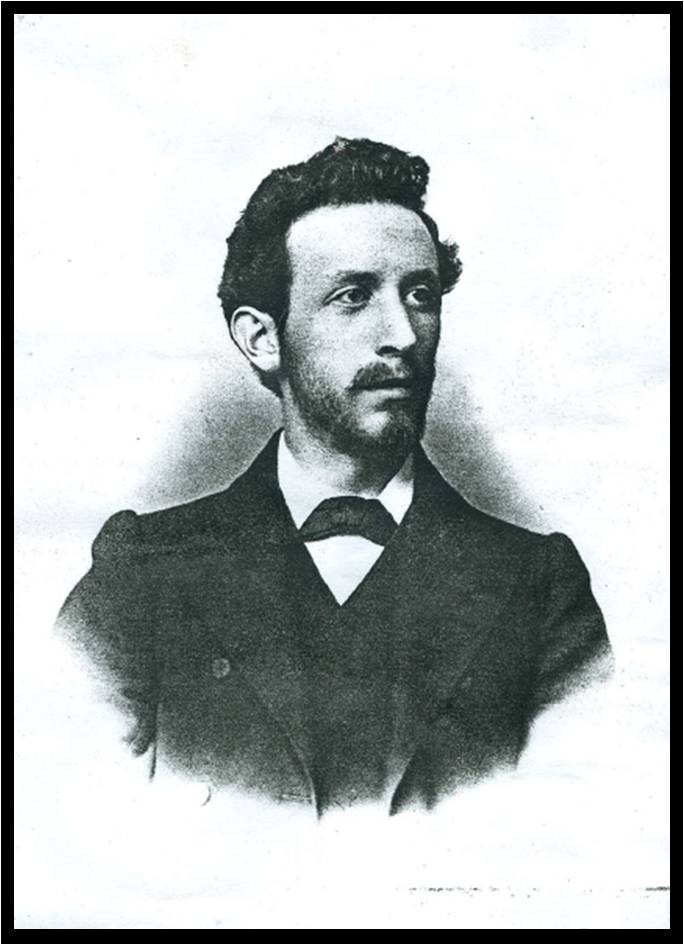
Rev. E. J. Pulsford as a young man.
Most on this page called Grandad "Uncle".
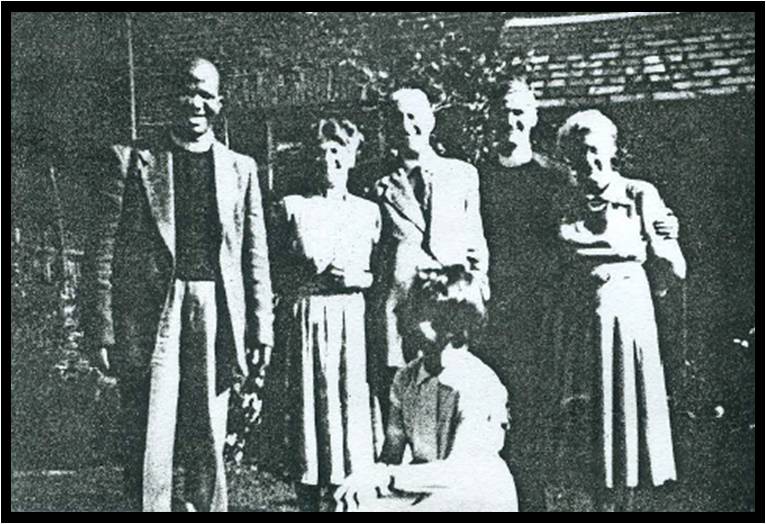
From Left:
Rev O.S.D. Mooki,
My and Mrs L.H. Pulsford,
CHP and Mrs Jenny Trobridge
[Judith in front]
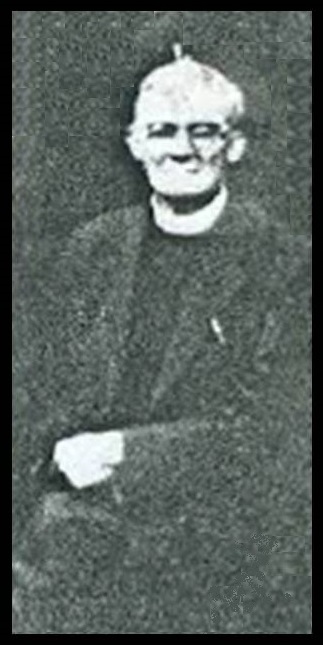 |
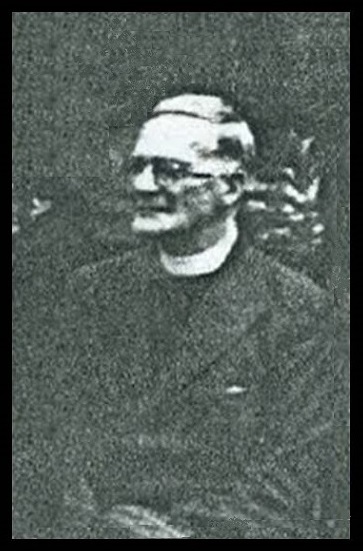 |
| My only pictures of P.H.Johnson! He called Grandad "Uncle". |
|
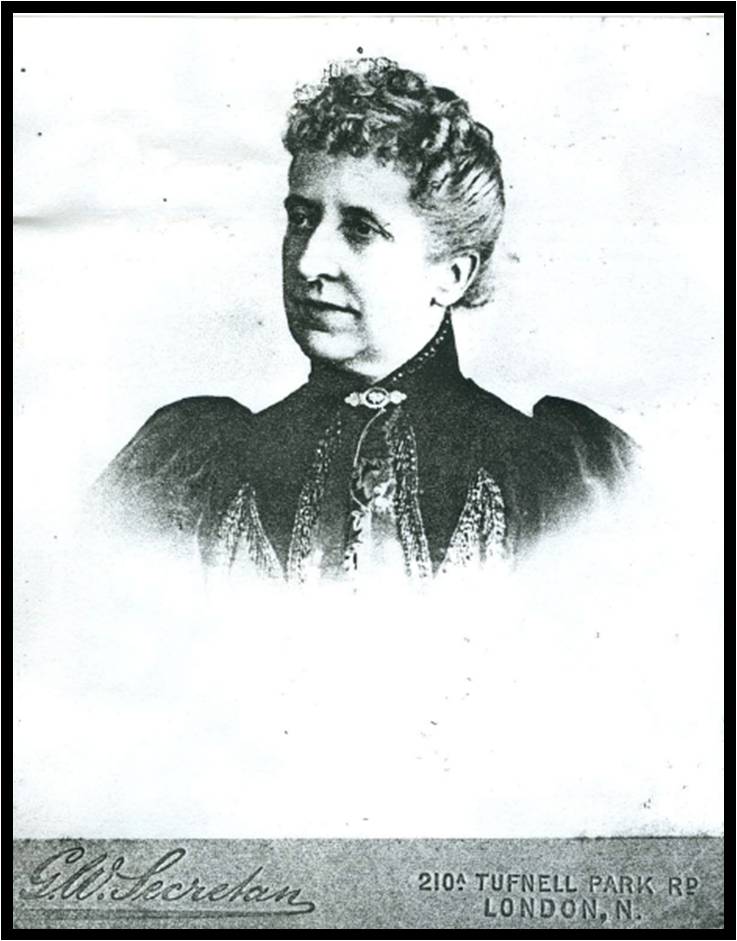 |
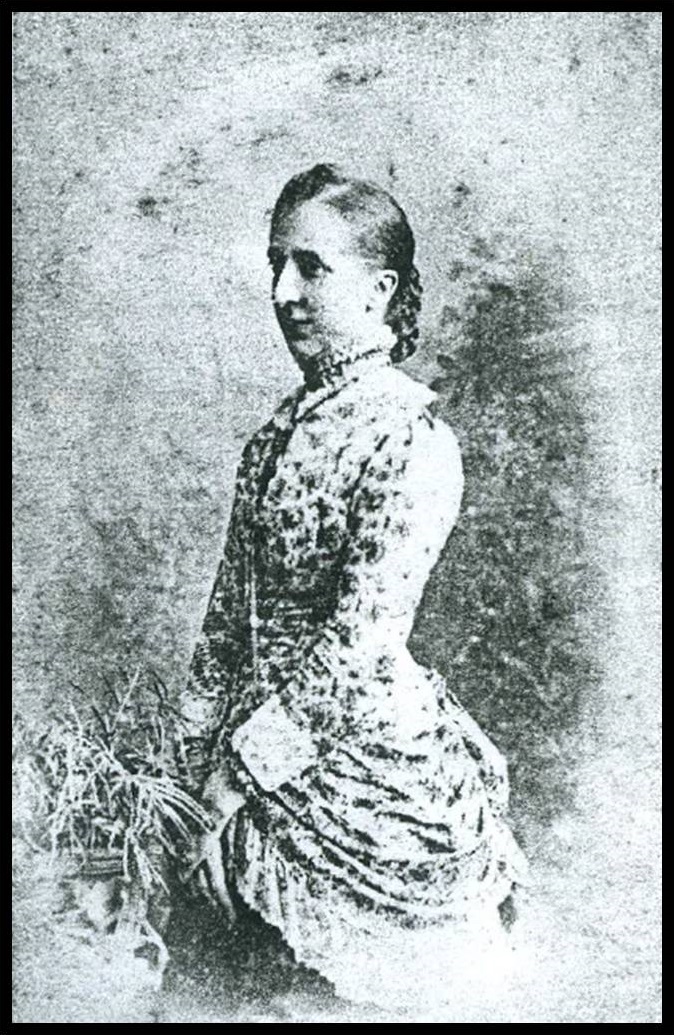 |
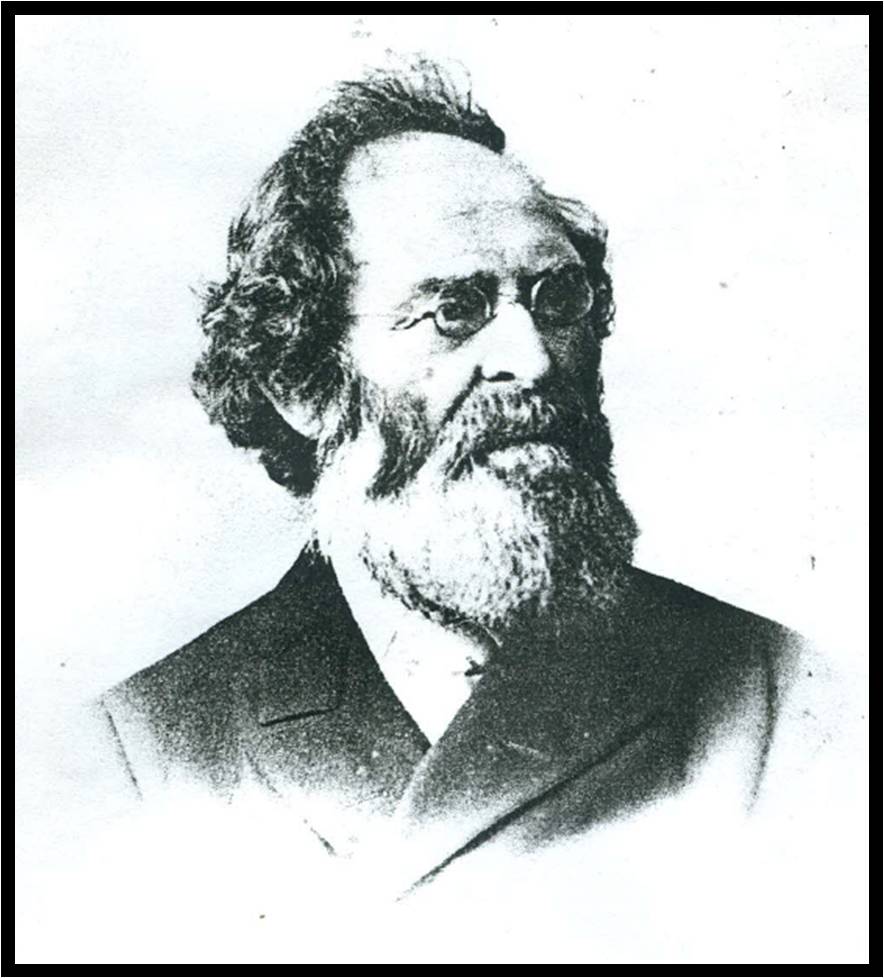
Mr and Mrs James Graham
[she was Mary Jane Presland]
SO THEY CALLED HIM UNCLE!
THE JOHNSONS. Mrs. Thomas Presland was a Johnson (page 35) Her brother married Jenny, and they had a son Alfred. That Alfred married, and had a son called Philip Henry Johnson. (There were others in the family - I remember a Leonard Johnson – then Edith who married Rev Isaiah Tansley) then Maud then Dorothy, but I have been unable to sort them all out.)
PH Johnson in 1926 applied, in a lengthy letter I must return to the archives, for admission into the Conference ministry. He was proud of claiming relationship with names of such distinction in the Church as Presland, Watson, Potts and Butter. (I don't know how we relate to Butter - see my note on him in Lifeline magazine circa end 1983.) He went on to say he'd taken a BA in 1901 ("only a second division"!) and been a teacher. (He taught my father at Tollington School, Hornsey. ) There were 20 years of this, last 16 as head assistant. He joined the RAF in 1st world war: then took a BSc Zoology and Physiology, in a desire to compare the most recent findings there with the Writings of Swedenborg. "Stayed on in Zoology Dept, at University College, had his research published by Zoological Society. Became an FZS and an FRGS. In 1924 invited to join an expedition to the South Seas as biologist and after his return wrote an account and gained a living, clearly not too good, by writing and lecturing. (CHP still thinks he was right and PHJ was wrong, when they disagreed vigorously in NC Herald 1950, CHP thinking PHJ wasn't good at translating the Arcana. PHJ was cross, otherwise the two were always good friends! A brown pocket edition of Arcana Caelestia Vol 4, in my study, has the exchange of words glued in!) PHJ entered the ministry, served for some time in South Africa, also at Willesden, Failsworth and Snodland. Did a lot of work for Swedenborg Soc., where his own approach was not always acceptable to everyone. Married Kathleen Williams of Camden Road. Father of our Pat Johnson, ARIBA, and of Rev. Ian Johnson, BA (Oxon. )
MRS JAMES GRAHAM (see p. 32 now.) Great-aunt Mary Jane Presland,
WAP's sister, married James Graham, in March 1893. He died in April 1895. Living
in Dundee, a bookseller by trade, he ordered a copy of Giles "Nature of Spirit",
for a customer who never collected it. This led him to read it himself and bit
by bit to become a devout New Church member.
He sought the help of the Missionary Board, which sent Richard Gunton to lecture at Dundee. (Richard Gunton's lectures started the Anerley Society off!) A small Society was founded in Dundee, of which James Graham was virtually leader. He married Mary Jane Presland, and moved to Tufnell Park, North London, for what seems to have been so short a married life. Mr. Graham obviously was a charming character - and his surname became a Christian name in the family. The obituary notice gently suggests Mary Jane married him in love to care for him in his dying year or two. I will check my dates and do a p.s. if I find more. No children to call him Uncle! [My dates are right. Nothing more known]
MRS. E. M. PULSFORD Great Aunt Ruth Presland. Her husband the gentle, devout and devoted Minister, much of his time at Alloa. They had two sons and 3 daughters one daughter, Jenny - a name which we met in the Johnsons - married Ernest Trobridge, the architect who has recently become prominent in his circles (see an article I did in Life-Line say 18 months ago.) She therefore became daughter-in-law of George Trobridge, ARCA, artist and author of the classics Life of Swedenborg. (George had married a Huntley, Great-Aunt of the Mr. Huntley living in old age at Bournemouth). (Mr Huntley now with son in USA). George wrote a lot, lived in Belfast - held New Church services in his home. Rev. John Rous Presland became his son-in-law.
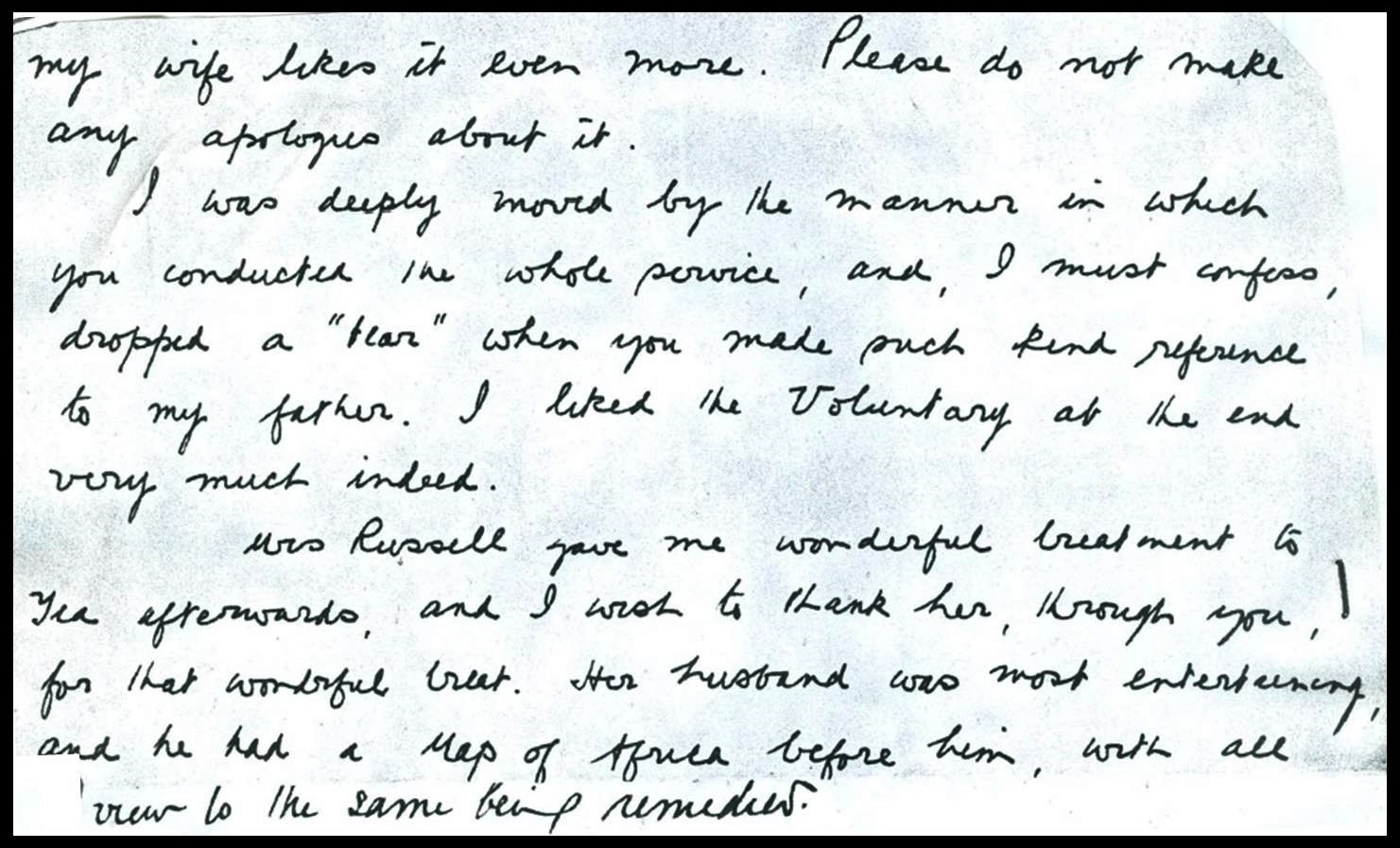
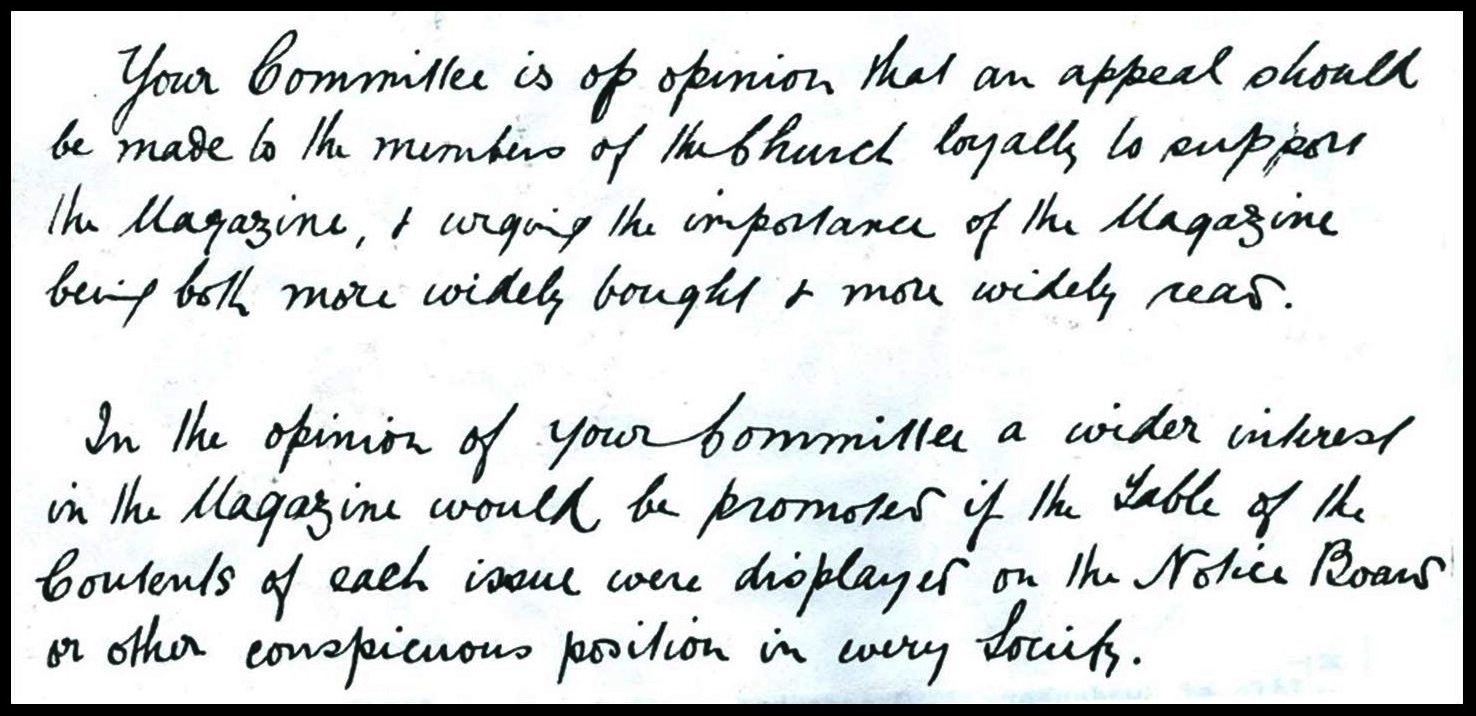
The hand-writing of Rev. Mooki and of Edward Pulsford.
 |
Found amongst my papers - a "Farewell Dinner" to
Ray Pulsford's Uncle Edward (the Rev.E.J.Pulsford)
when that gentleman left in July 1924 to become
Superintendent of the New Church in South Africa.
David Wynter, a very prosperous gentleman who owned most of London's launderies, used to enjoy being hospitable and this will have been his treat. A menu like that in those days must have cost at least 10/6 - 52p. in our money - I suppose? I think I must give this menu to the Library and Documents Committee! |
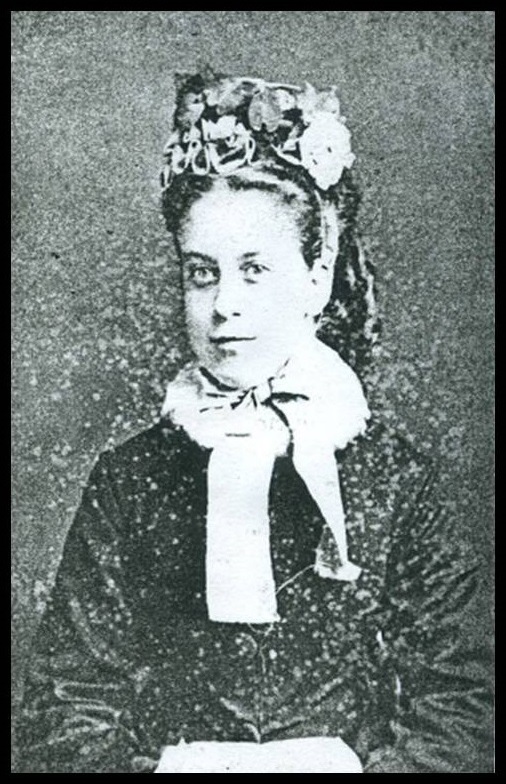
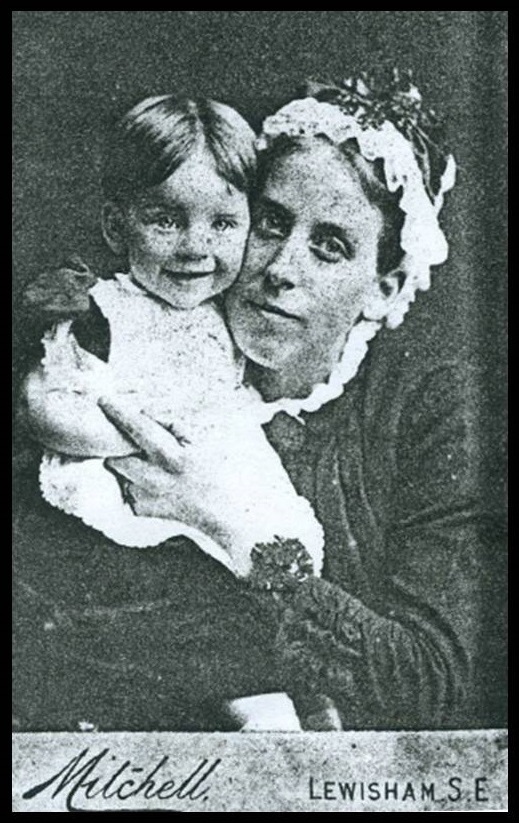
Caroline Howe, nee Presland
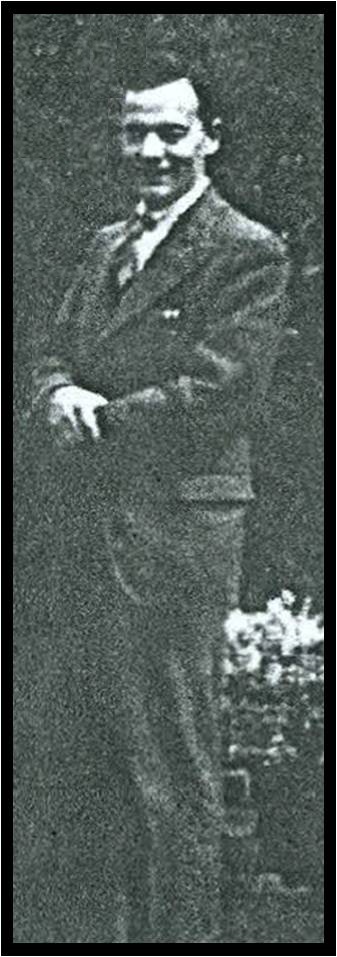
G.T.Hill c. 1943
Of the other two daughters, one became a Mrs. Hardy and, I believe, went to the USA with her husband: the other was somewhat handicapped by a low IQ. I confess to knowing little about her.
The two sons? The older, the Rev. Edward John Pulsford, a great minister of the Church. He served several English New Church groups, and Woodlands Road in Glasgow. A great scholar, something of an author, greatly respected. (His son Edgar lives in Abingdon and has been a lay preacher since 1939: his daughter Ruth, unmarried, lives in Dursley, Glos: the other daughter, at Ilkley, married George Herriott Hunter but, unhappily, there was a divorce.)
For me, a thing about "EJP" that I think may never have been commented on but which to me is a nice thing. EJP went for some years to our South African Mission, and at that time Obed Mooki, now such a leader in the Church there, was a little boy. EJP recognised his abilities and determined to see Obed's possibilities fulfilled. He spent hours with the lad - and taught him so much. The handwriting (see next page) of EJP and Obed Mooki is almost identical Obed writes the hand of an English gentleman! I envy him it!
The other son of course is Laurence Helier - the second name because he was born in St. Helier where his father was minister at the time - father of Ray and Garth and Beryl. We all loved him - and his wife Nellie Hill, sister of the Rev. G. T. Hill, who is of course Uncle George in the Pulsford family today, as our Grandpa Presland was Uncle Will to Laurence Pulsford and his dear Nellie.
MRS. JOHN FOSTER HOWE (see page 35) Great Aunt Caroline, named I suppose after Queen Caroline, book 1 page 5. I don’t know a lot about the Foster Howe family. Prominent people in Bromley - he I think a J. P. and if I recall aright Phil Jowett when applying for a post in Bromley was interviewed by a Howe. A son, Eric Graham Howe, became a Harley Street psychologist - a qualified doctor - and a bit of an author.
A daughter became a Mrs. Jenkins (Dora Jenkins, lived in South Woodford) and had a son Ivor, who was a G.P. Still a large number of Howe names in Bromley, probably many of them connected. (Note how Graham becomes a Christian name.) Rev. Alan Grange reviews a book by Graham Howe (Herald magazine 1950).
(Faber & Faber. 15s.)
The psychology of Dr. Graham Howe is based upon a trinity. The deepest element in man may be entitled variously Will, Spirit, A-factor, Father-principle. This is embodied within what may be called External, B-factor, Mother-principle, or Body. Man is conscious of tension between the two, and his attempts to set up a satisfactory relationship between them constitute the third element in the trinity. As a psychotherapist Dr. Graham Howe wishes us to establish happy and fruitful relations between A and B. From the evidence of case-histories he argues that mental illness arises from inadequate attempts to bridge the gap.
The book includes an analysis of three types of illness, the spoilt child, the inferiority complex, and compulsion neurosis. The mechanisms of fixation, identification, projection, and many others, arise because the patient cannot face the creation of healthy relationships. These should grow slowly, in love, patience, and understanding. The neurotic cannot wait for normal growth. He can, for instance, remove his feelings of inferiority by identifying himself with a dominant group. This is quicker, and hurts less, than normal self-criticism. Yet we must beware of saying, "It's your own fault". Often the neurotic has been mishandled by parents, or has inherited a tendency to such weakness. He needs the guidance of psychotherapy.
This book may be recommended to New Church people who think that psychology can help. The author's doctrine of incarnation is set out carefully, with the aid of diagrams, but the exposition is free from continental rigidity. New-Church readers may find this trinity somewhat similar to "Soul, Body and Life Proceeding". Although Dr. Graham Howe has associations with the New Church, we ought not to jump to conclusions. Facts of life must be discovered by science, sooner or later. A. G.
There were others, I recall. "Triumphant Spirit." I never read any of them.
In March 1872 a John Finnie bought and gave to Conference a church in Palace gardens, Kensington. Under the famous Dr Bayley, from having NO members, it became in 14 years the second largest New Church Society in the U.K!
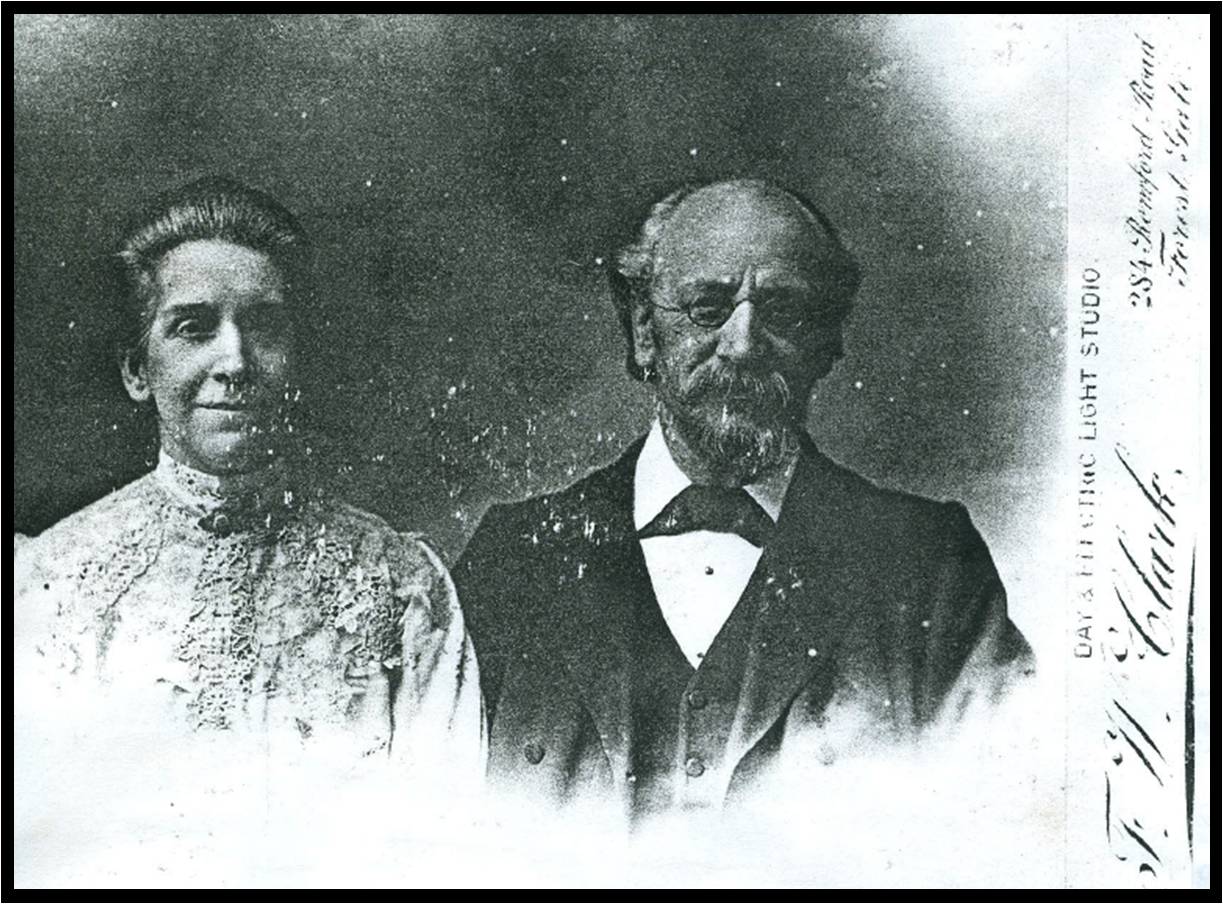
Mr and Mrs James Humphreys
– nee Sophie Presland
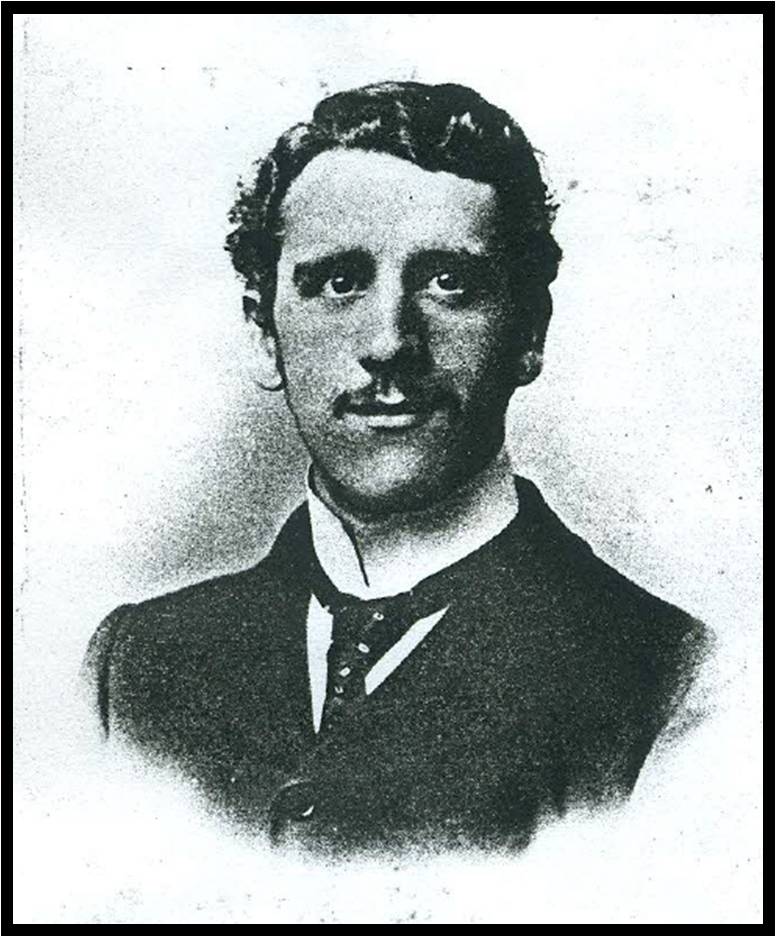
Their son, Foster James Humphreys.
He called Grandad "Uncle".
It is worthy of comment that the John Foster Howe marriage was the first in the Kensington Church.
MRS. JAMES HUMPHREYS Great Aunt Sophia Matilda.
There is an article on page 34 which tells us that great-grandfather Thomas Presland spent the last years of his life with his youngest daughter and her husband. (He had been a widower nearly 20 years.) My generation knew 31 Romilly Road fairly well, for that was a Humphreys home, but this home of the James Humphreys was up the road at 39. I do not know much about the James Humphreys, except that they were Camden Read people. Virtually all the Preslands in those days were Camden Road or Argyle Square. John - who died in 1897, only 58 years old, was Minister at the latter Church: William was to come to Camden Road that same year. The family was living around London as a whole - and 39 Romilly Road would have been a frequent calling place for them all to call to see Thomas. There were six children of this marriage - Foster James Humphreys and Ernest (never married), Lilian Goodman, who had one daughter who died young, Wildred and Muriel (neither had children) and Winifred who did not marry. Muriel, Mrs Spurgeon of Bristol sent me the photos.
Foster James Humphreys had two daughters, Emmie and Olive (the latter had some epilepsy) and two sons (one died aged 19) Herbert - Bert to us all - who I believe is not now living. The two daughters are alive and living in the West Country. All were very active in our youth at Camden Road.
Foster J. Humphreys - a Memorial Notice to him, and also to Rev. E. J. Pulsford in the 1953 Year Book - was a lay preacher of some ability. At one time leader of the Willesden Society and, during the war, he took charge of the Leeds Society. He, together with the late George Dicks (uncle of Mrs. Raymond Pulsford, etc)., was one of the very few who had the courage to speak at Speakers' Corner and on Tower Hill on New Church teaching.
My task on Chapter 3 is nearly done. You can all get to work to tell me how it works out, but in June 1923 Grandad Presland wrote a memorial notice for Miss Kate Watson. He said that Thomas Watson, "the Model Deacon" of Bayley's "Early New Church Worthies" had "sons and daughters who grew up in strong attachment to their Church. The eldest - the late Mr. T. G. Watson of Southport, and his sisters, Mrs. J. F. Potts and Lady Mather and Miss Kate Watson... their cousin on the mother's side, the Rev. John Presland." and of course Grandad Presland himself. This I have never unravelled - it may be possible to do so, but it would need research in the Church archives. I know that the Rev J. F. Potts, the indefatigable producer of the Swedenborg Concordance in six mighty volumes, went to America and to Bryn Athyn for the last years of his life; I do know that Sir William Mather, a founder of Manchester's great engineering works of Mather and Platts, and an active member of the North Manchester New Church and a trustee of the Conference, all his life remained loyal to the Church and a memorial notice, after his death in his home in the New Forest, must be in the Conference Year Books. But you tell me - what did WAP mean by "cousin on the mother's side?"
|
|
The admirable cousins, so different yet fired by the same faith, "EJP" and "JRP" |
And so, apart from a few final comments, we are left with only Grandma and Grandad's four sons to bring into the story. And here I would think a new chapter must begin - and perhaps from another pen in the family?
Four sons – John (Rous was an adopted name, to keep the several John Preslands separated for clarity); Claud William - who was a civil engineer and got an MBE in the first world war for work on munitions and who lived in Shepperton by the river in our youth; Frederick Richard, "Pop" and "Mim" his wife; and Herbert, Uncle Bert, who died quite a young man some time after returning from working in the USA.
John Rous Presland married Dorothy Trobridge - thus again linking us up with the Pulsford, for Dorothy's brother Ernest Trobridge had married Jennie Pulsford. Aunt Dorothy had been a sister in one of London's teaching hospital. They had a son, Graham, who lives in the St. Helen's area having spent his life involved in adult education - he has an Oxford Master's. Claud's son Peter was killed in the second world war - his unmarried daughter Pamela still lives in her parents' home at Wooton-under-Edge, Glos., and makes a living as a music teacher and with her clarinet. (Uncle Claud was an accomplished violinist with the Royal Amateur Orchestra.)
I leave it all there, for this is our generation.
------------------------
But perhaps, since this writing of mine has been so much New Church-orientated, understandably I hope, a word about the Rev. John Rous Presland. Obituaries have become shorter, but I give you his. Uncle John was so lovely, so courteous, so accomplished. (My three, Judith, Elisabeth and John) will remember how, when we used to travel from Failsworth to Bournemouth on holiday, he would invariably be on the platform at the Bath station to have just a few minutes with us and to hand out peaches all round!) He held the affection of all his Church colleagues: yet he never became President of Conference or preached the Conference sermon at our Annual Meeting - a thing most of us have liked to do - in days when, admittedly, there was more competition amongst the ministry so that many men did net achieve these things. But he could have done, so well. He had the presence, the scholarship. But he knew, and accepted, that he could not represent the Conference thought. When he left the College, he was very traditional in his thought, or so his writing at that time would suggest: but as the years passed by, he became increasingly liberal in his thinking, too much so for most of his colleagues to go along with him: intellectually, he became the odd man out; in his person, he moved very much in the centre of these who loved him but could not agree with him. Looking back now, I think he may have been more right than many of us thought: in today's organization, he would stand out as a leader amongst us, or so I think, for the very width of his approach, but even now many would want to hold him back! I know I still would - but for the 17 years in which I sat in meetings with him I, like all of us, loved him dearly. And we all of us listened to him when he spoke.
EDWARD JOHN PULSFORD
IN January, 1943, the Rev. Edward John Pulsford was appointed Editor of THE NEW-CHURCH MAGAZINE, the first issue under his editorship being that of April-June in that year. Within the memory of many of us the Magazine has had notable editors—the Rev. J. R. Rendell, B. A., the Rev. Henry Gordon Drummond and the Rev. P. H. Johnson, B. A., B. Sc.—and although the journal to which Mr. Pulsford succeeded was but a shadow of its former self, a very small journal hampered by wartime restrictions on paper and printing, he brought to it gifts which declared him in the true line of succession and give him an equal place among his illustrious predecessors.
It was not an easy task that he undertook. THE NEW-CHURCH MAGAZINE is intended to appeal to thoughtful and studious readers; in its articles we expect to find a scholarly and well-informed approach to the themes under discussion; and whether the theme be scientific, theological or something else, we hope for a penetrating analysis of it in non-technical language that will enable the intelligent but inexpert reader to understand it. To achieve this end in wartime when many of those who could be expected to write such articles were heavily burdened with other responsibilities, and to achieve it within the extremely limited space of the MAGAZINE of those times, was a difficult task; indeed it was sometimes an impossible one. If the MAGAZINE sometimes failed in respect of one or other of our expectations the blame is hardly to be imputed to the Editor. No Editor can achieve the impossible, and we wonder rather at the measure of success that Mr. Pulsford attained amid such hampering conditions. It was notable that with improving conditions he took advantage of every improvement to realize the ideal of the MAGAZINE.
The impression that Edward John Pulsford made upon one, even from a first meeting, was of a singular personal integrity, and however well one came to know him this was the impression that remained. One felt that his personal standard was high, but that it was his standard for himself, and certainly he never attempted to impose his own standard on any one else. For this reason, while one perceived an atmosphere of austerity about him, it was never a chilling austerity. If he seemed to build a fence of reserve about himself, it was a fence that did not hide or check his kindliness and sympathy. Seldom, if ever, did any criticism of persons pass his lips, and a condemning judgment was foreign to his nature. In argument he was generally content to be silent; but if required to do so he would express himself in such a manner as to leave no doubt of the firmness and definiteness of his convictions and yet give no occasion of offence to those who might differ from him. Dignified, courteous, warm-hearted, he moved among men as one set somewhat apart.
To work with him was a pleasure. His mind, well stored with data, moved with precision through complicated problems, weighing carefully the pros and cons of any proposition, and willingly receiving any new suggestion that might be offered. Though normally somewhat slow and deliberate in speech (due partly to his awareness of a very slight stammer), he could, on rare occasions, rise to heights of flowing and almost impassioned eloquence, yet even then his use of words lost nothing of his ordinary precision. This exactness or precision of meaning and grammar was by no means an affectation with him. It was the expression of an exact and precise mind that could not possibly be careless or slipshod in thought or speech. As a form of humour he delighted in a subtle exaggeration of his own peculiarity, and letters from him written in this "very slightly larger-than-life" strain, have gladdened many a dull morning.
The Rev. E. J. Pulsford was, in every way, a son of the manse, and of the New-Church manse. He was born in Jersey, the elder son of the Rev. Edward Miall Pulsford. His childhood and youth, however, were spent in Scotland, to which country his father moved in 1880, two years after the birth of this elder son. His mother was a Presland, sister of the Rev. John and the Rev. William A. Presland, and it was natural that when he came to London at the age of sixteen years or so, Edward John should make his home with the Rev. John Presland, then Minister of Argyle Square Church. He subsequently entered the New-Church College, and, after a four years' course there he was ordained in 1905. He held pastorates at Besses o' th' Barn, Bath and Moseley (Birmingham) and thereafter spent four busy and fruitful years in South Africa as Superintendent of the New- Church Mission there. For the next ten years, until 1938, he served the North Manchester and Salford Societies and then removed to Woodlands Road, Glasgow, where he remained until his recent retirement. For very many years he had been a member of the Committee for the Translation of the Old Testament, a work in which his painstaking thoroughness was most highly valued by his colleagues. As Correspondence Tutor for West African Students he served the New-Church College with unspectacular diligence, and it is pleasing to remember that he saw a great reward for this exacting labour when two of his students, having passed the necessary examinations, were this year ordained as Ministers, the first West Africans to be ordained in their own country into the Ministry of the New Church.
Twice, in 1920 and in 1941, the General Conference honoured the Rev. E. J. Pulsford by appointing him its President, and in 1943 he was inducted as an Ordaining Minister. Within the Church he was universally respected, and those who knew him best, best loved him.
On August 20th, 1952, suddenly and in sleep, he passed into the Spiritual World. He has left behind him, in this world, his wife, a son and two daughters, all of whom share his own deep faith in the reality of spiritual things and who, in his parting from them for a while, rejoice in the knowledge that he is restored to still more active uses than those which ill-health so recently caused him regretfully to lay aside.
The Rev. John Rous Presland [1958]
The Bath society has suffered a grievous loss in the passing of its former minister, who was called peacefully to the higher life on Monday evening 25th August. The funeral was held on Friday the 29th in a full church at Henry Street, conducted by Rev. C. H. Presland, Secretary of the General Conference, and Rev. Frank Holmes, minister of Bath. Thence the mortal remains were taken to Locksbrook cemetery.
Rev. John Rous Presland was for fifty years an ordained minister of the Church which he served in pastorates at Blackpool, Willesden Green, Snodland, and Bath; which last he served for ten years until his retirement in 1948. For some years he was secretary of the Swedenborg Society in London, where he had charge of many publishing interests. He was a past President of the Bath Branch of the United Nations Association, and, at the time of his death, was membership secretary of the branch.
He was also a past governor of the City of Bath Boys School, Hon. Secretary of the Bath Vigilance and Rescue Association, and a member of the Bath branch of the British Empire Shakespeare Society. Since his retirement he had been a member of the Bath Free Church Federal Council, and Hon. Chaplain at St. Martin's Hospital; he also took services at the Eventide Home.
His interests were wide and broad, and hence he will be greatly missed. His zeal for the New Church locally, in the whole country, and even overseas, remained unabated. He held successive offices in the General Conference, being at one time Secretary of the Missionary Board, and, for many years, an active member of the Overseas Missions Committee. He came to all services and meetings to the end, even travelling by taxi many times that he might not miss the use of his presence. He took services as late as last February. It is good to know that he continued to the very end, for he was present at the Ministers' and Sunday School Conferences at Wigan in May, and at the General Conference at Snodland in June. It is characteristic that his last words were those of kind regards to a friend, a Vicar of a church near Oxford.
To all his many activities he imparted a spiritual life. This is what the New
Church meant to him. His living New Churchman- ship was to treasure the near
presence of the Lord in everything that he did. This was what he valued above
all, the fact of the Lord's being ever near working by His Holy Spirit. Response
to the Lord, reception of His Holy Spirit—these gave the characteristic
gentleness and tone to this prophet's life and conversation. A friend has
written: "He will be sadly missed by his neighbours. Tall and dignified, with a
pleasant word for all, he was much loved by his friends". We offer deep
sympathy to his widow, son, and relatives, yet feel that, in their faith, they
will not grieve unduly, but will think of their good man in heaven. One more has
now passed through a grand life of spiritual uses, and has been now called, with
all his excellent qualities, to the extended life in the higher sphere of the
Lord's Kingdom in heaven.
F. C.
And so (as I remarked on page 52) I found myself in 1956 the first Presland to represent the British New Church in the USA. I found myself at once amongst loving, warm friends whose generosity and care knew no bounds. It was 19 days (which at the time I wrote up in some fulness in the Herald) of great joy, limited only by the fact that finance had not permitted me to have my wife with me. I was welcome for the name of Presland, so familiar in the Church there. Discussions in the first few hours allowed me to borrow a typewriter and knock off something called at the time "the Presland Memorandum", which they all gladly accepted as a statement removing all lack of understanding between them and us which had grown up since (and perhaps during)the second world war. After that, I moved in worship with them: I broadcast on their local radio station: I discussed with them: I teased them and they teased me! It is all part of family history, for they knew the Presland family by name if not in person - and Uncle John Rous has been an honorary member of their "Convention Liberals". They made me an honorary member of the alumni of their theological school! And I nearly got all their money - I hopped to my feet in their meeting when the result of their election for treasurer was announced and, indicating that I was not upset that others had let their names go forward, asked that their funds should he put safely in my hands before I flew back home
I said that I assumed that in America, where of course they did things "much better", votes were cast against and not for candidates. Only so, I suggested, could I find their voting results explicable. And I was sure the other candidate, who had the sane support as I did, would, as a perfect host, withdraw. I gather a lawyer in their company said they must fully report, by the laws of Indiana, the result of their elections - so we got the following:-
ADDRESS TO THE BRITISH CONFERENCE OF THE NEW CHURCH
To the General Conference of the New Church Greetings: —
The General Convention of the New Jerusalem in the United States of America, assembled in its 133rd session in the City of La Porte, Indiana, extends to its brother organization in Great Britain, the General Conference of the New Church, the heartiest greetings and most sincere good wishes for your Conference even now on the point of gathering. From the very beginning of the co-existence of our two organizations, our spiritual ties have been of the closest possible - a true union of brotherhood. Through the years, and gradually, the natural limitations of distance have been overcome, but we pause in wonder at the thought that we place this greeting in the care of your representative, who, within a few short hours, will place it before you with his own hands.
We would assure you anew of our keenest interest in your deliberations, our sym-pathetic awareness of some of your problems, and our confidence that your sessions will result in a forward step in the cause of the New Church. We rejoice that in the Divine Providence you have given us the privilege and the great pleasure of enter-taining such a vivacious, dynamic personality as your representative proves to be. We have taken Rev. Claude H. Presland to our hearts and find ourselves reluctant to let him depart. He has given us a vision of a growing Church which has been an inspiration to us all.
We look forward to a resumption of our annual exchange of fraternal greetings and hope that no circumstance however inadvertent will interrupt the joyous custom which has helped unite us through the many years of our association one with another.
So too with the exchange visits of personal representatives to our alternate annual sessions, we pray that no national emergency with its after-years of adjustment, may ever again prevent the continuance of the custom so valuable to us both.
May the Lord bless the sessions of your Conference in which you are about to engage. Our thoughts will be with you, our prayers surround you.
On behalf of the General Convention of the New Jerusalem in the United States of America, by its Recording Secretary,
HORACE B. BLACKMER
La Porte, Indiana
June 23 1956
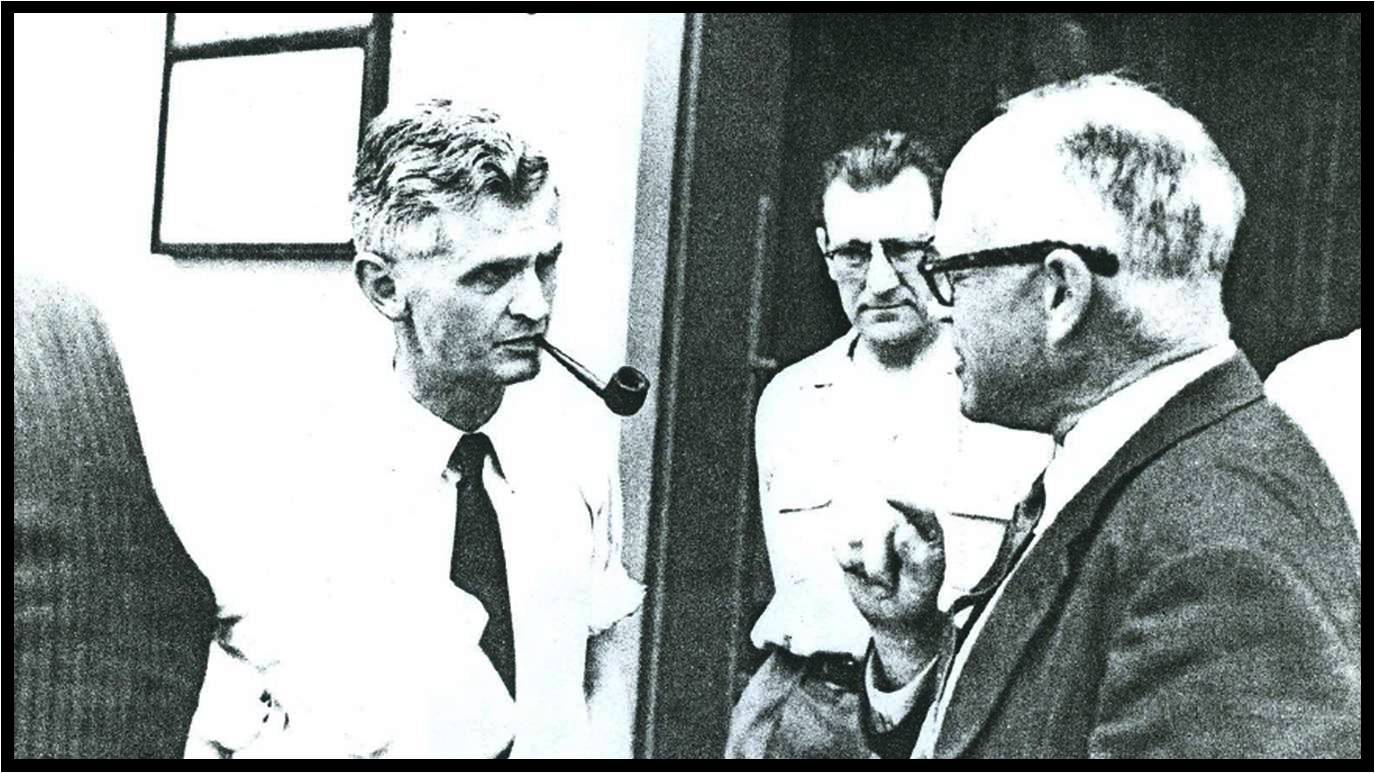
Left to right: me, Rev. Leon C le Van,
Rev. Andre Diaconoff (a Russian emigree)

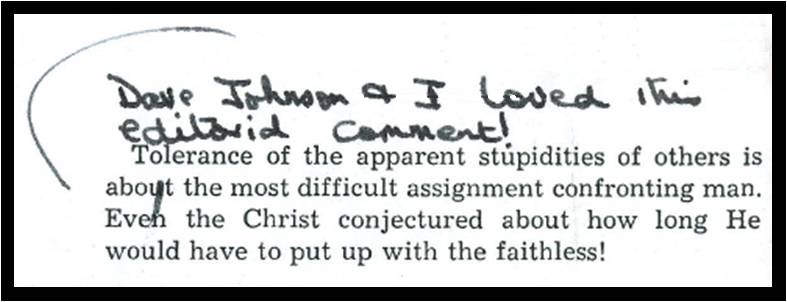
And there, on that light-hearted note, I incline to leave the history of the Presland family down to our parents' and "Pop's" generation) and hope you have found it at least not too dull. I recall some years ago, after I had written to the excellent Alan Drummond to encourage him in some troubles, this arrived without comment in post:-
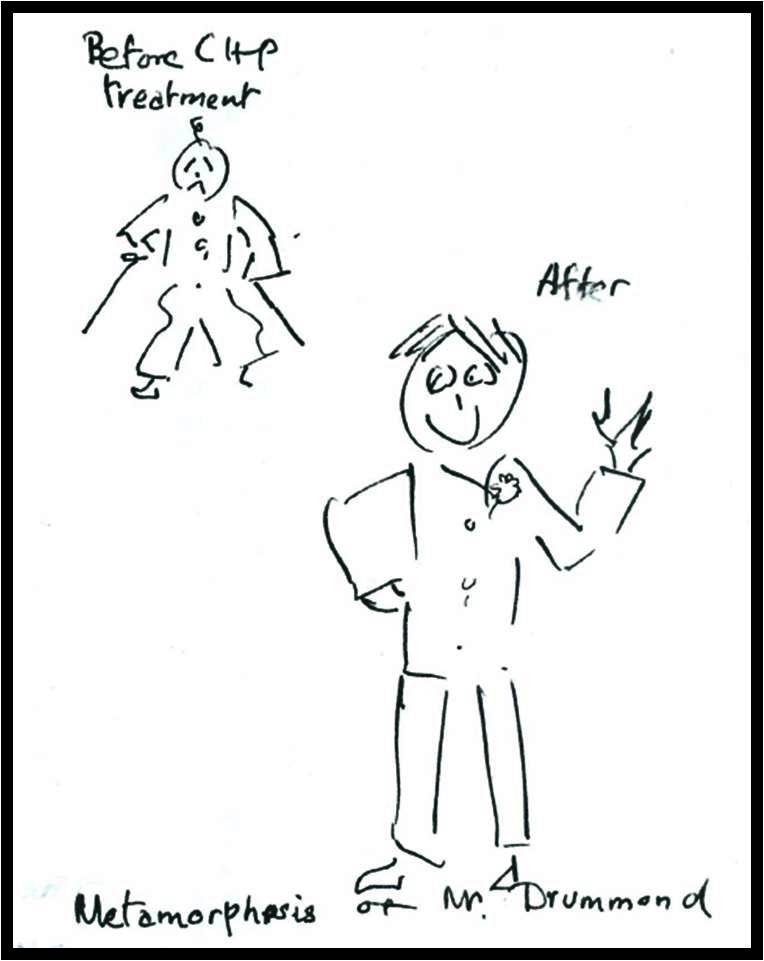
It is too much to hope you feel like that
after ploughing through all these pages!
But I prefer to end this chapter on a more serious note, a note of faith and optimism. (Chapter 4, due in April 1985, will pick up the Newall side of our family history, and there this New Church faith will again be sung. ) Since, before the battle of Waterloo, our family line is traced, our world has been a troubled one. I believe in a New Church, a New Age, a new world. Uncle Bert and "Pop" flew as pilots in war right back in 1915. Grandson Peter Wilson has just joined the Air Force. If I write a family history, it has to remember our brother Eric killed in war - in the Royal Air Force.
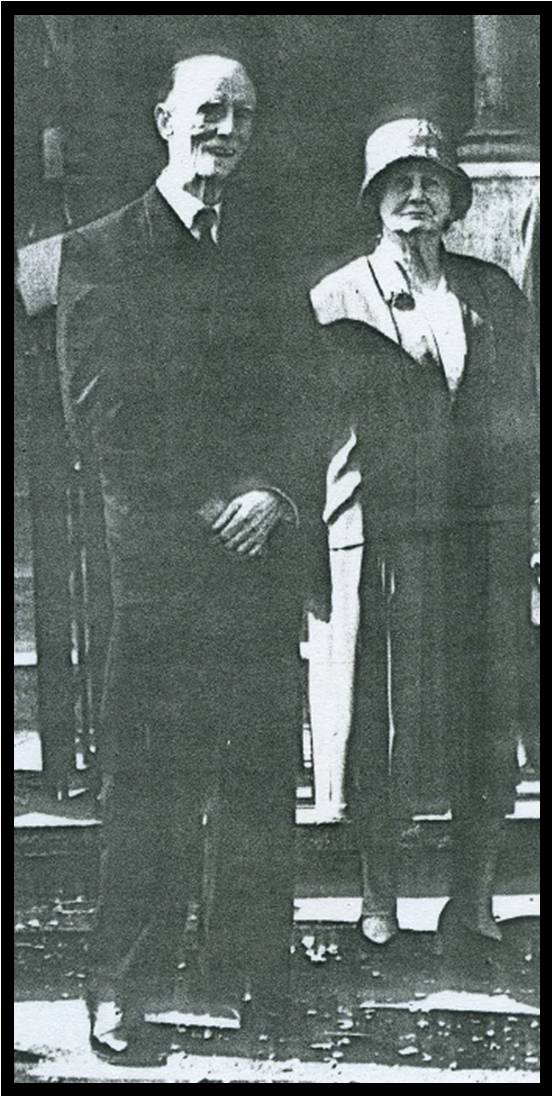
The F.R.Preslands "Mim" and "Pop"
I am proud that for generations the Presland family has held firmly to a faith in things spiritual and unseen - to a faith that says that men war against one another because they do not war against themselves. As Jesus said "a man's foes shall be they of his own household", the household of his mind. I declare from my heart that I have never weakened in ay belief in the Providence of our God to lead us to a new age. I echo John Presland, the hatter of Piccadilly: Grandad W. A. Presland left a collection of papers, at the time of his death, about his grandfather with a manuscript note that it would he good if, in the year 2010, two hundred years after the foundation of the Swedenborg Society by John Presland and other, a Presland could pass that collection over that Society. The collection is in my study, well marked.
And in those papers, John Presland the hatter declares his faith; "the Church of the New Jerusalem is the sheet-anchor of the whole world."
That sheet-anchor must not fail.
---------------------------------
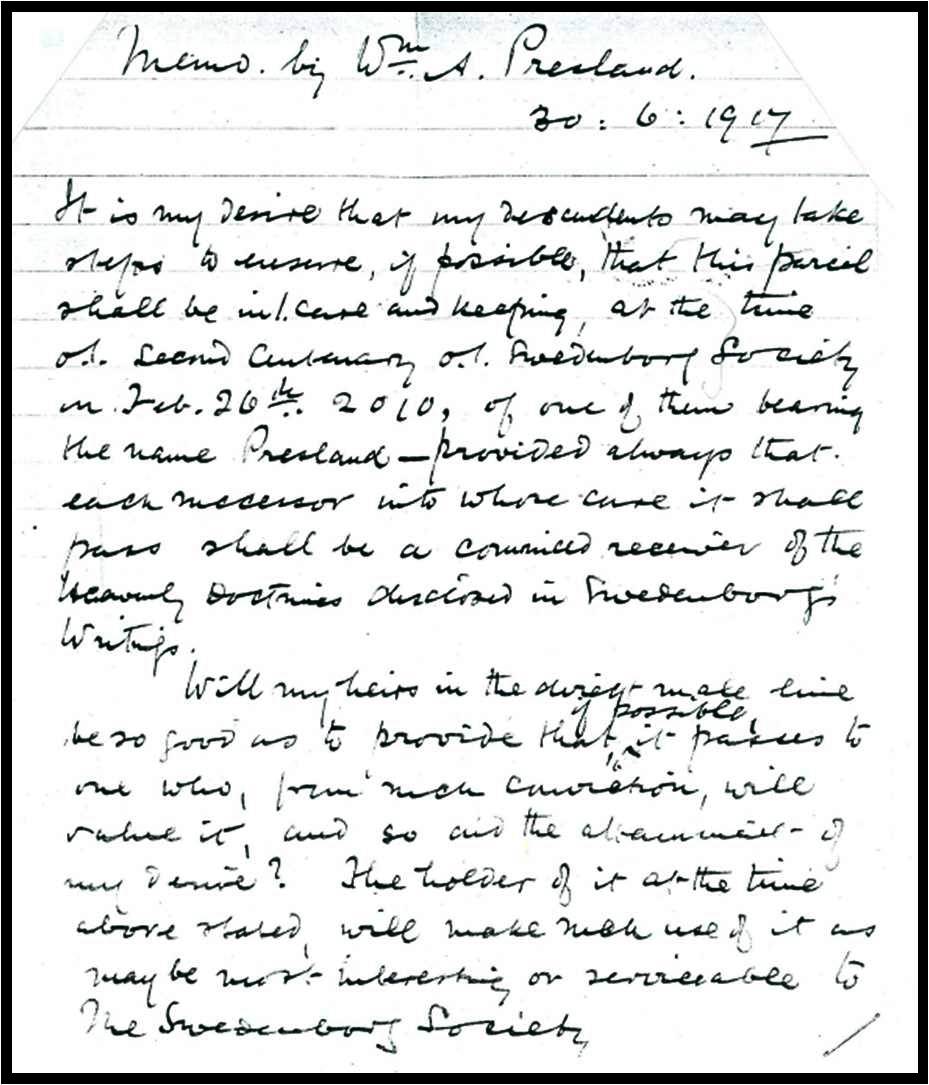
These papers have come down to me, and are in a small leather case in my study at present. I am sorry that dear old Grandad, very much in this respect a man of his day, was so insistent on the male line: I suspect these days you would find him, as an alert thinker, expressing it a little differently. But in any event you must in the year 2010 sort out how you want to play this one & be ready for the 26th of February that year. (I do not expect myself to be striding up aisles, not anyway in London). But I think it would be rather nice if Grandad's hopes came true.
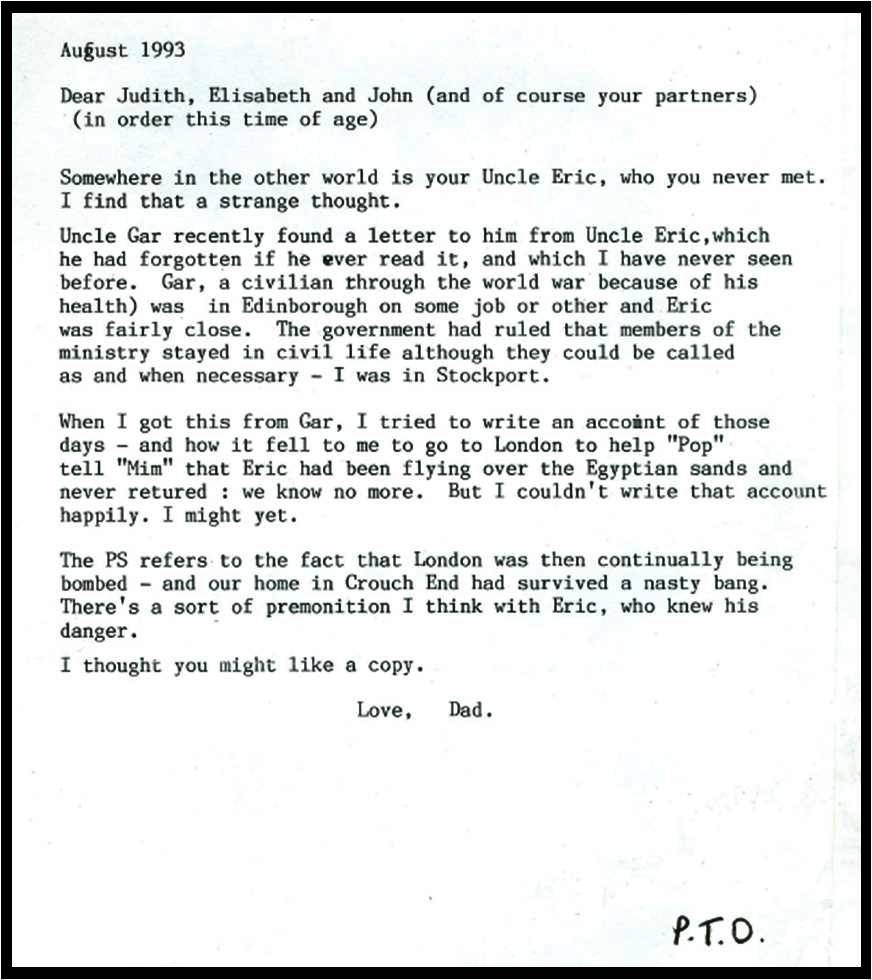
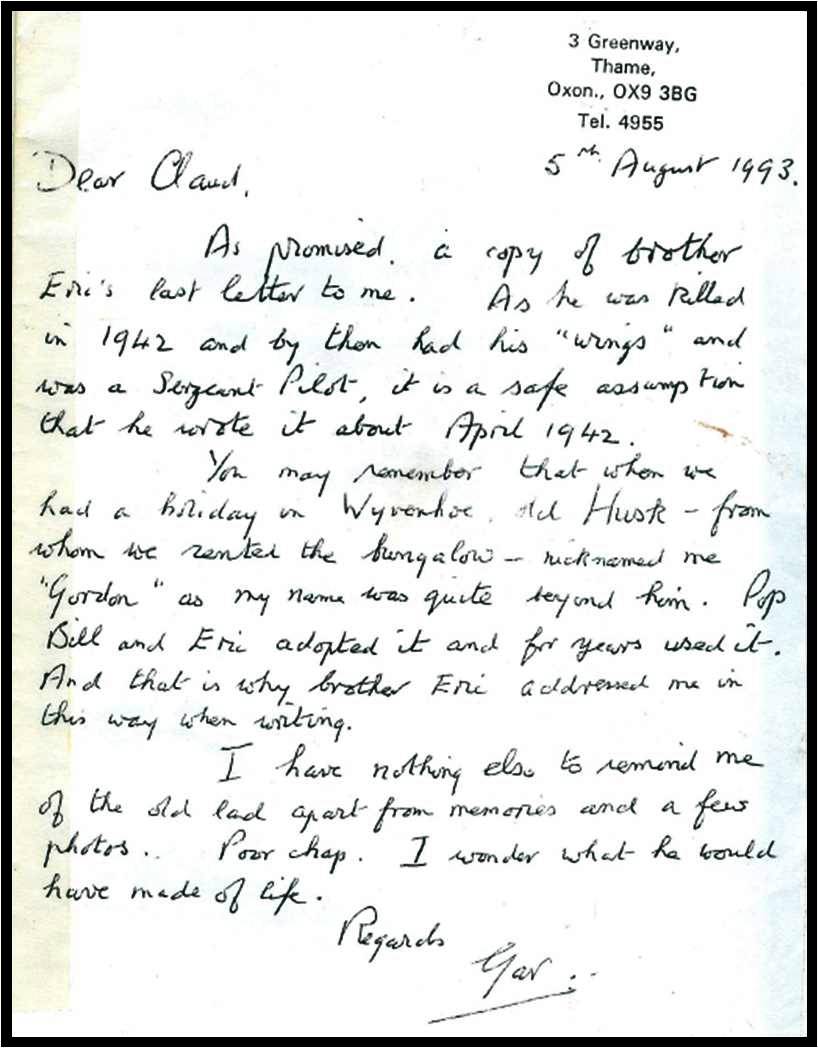

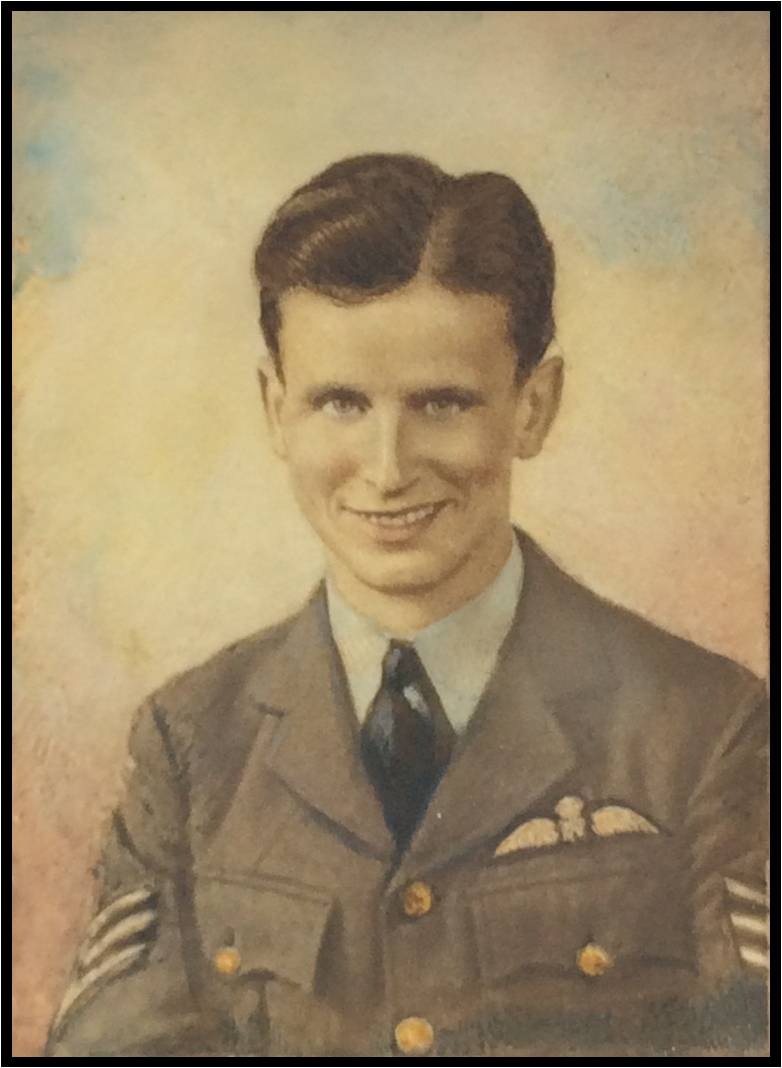
Eric John Presland shortly after joining the Royal Air Force, approximately 1942.
